Katrina Kenison's Blog, page 5
April 8, 2017
is video game addiction a real thing?
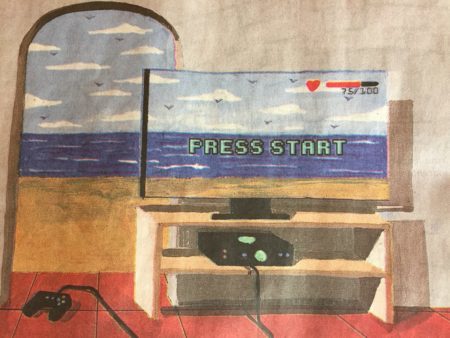
It’s January, 2009. I’m sitting at the desk in my older son’s bedroom, putting finishing touches on a memoir about the fleeting beauty of ordinary life — a book I began in an attempt to hold on, just a little longer, to my two children as I want to remember them in these years right before they grow up and leave home: tousle-haired, always hungry, generally happy, busy, and still (blessedly) around.
I’ve been writing The Gift of an Ordinary Day while living it for a while now, living it with a bittersweet awareness of just how good life is when we are fully present to its small mysteries and miracles. Despite the inevitable complexities of parenting adolescents, for the most part our family life seems rich and satisfying. And this winter, the end of the writing is in sight at last. I have only to complete a brief, upbeat afterword — a glimpse of Henry midway through his freshman year of college and a trip I’ve just taken with to visit him — and the book will be done.
However, even as I’m revising these final pages, the plot of our family story is taking a new, darker turn. The irony is not lost on me. I’ve just spent the better part of a year celebrating and honoring our family’s life together and now, it seems, our family is falling apart. And I have no idea what to do about it.
One gray winter afternoon, I email my editor that I’ve finished, attach the final pages of my manuscript, and hit the “send” button. I bundle up and go outside for a walk, to clear my head.
And then I return to my computer and Google the words “video game addiction.” There isn’t much to be found. I read an article about video games and ADHD, which states the obvious: excessive video game playing, it suggests, is directly related to increased hyperactivity and inability to focus in school.
I also read about a study on brain-imaging and video games in which PET scans are taken while a group of people play video games. The researchers note that the basal ganglia (where dopamine is produced in the brain) are much more active when the video games are being played than at rest. (Both cocaine and Ritalin work in this part of the brain as well.) Cocaine has a powerful, immediate effect that stimulates an enormous release of the neurotransmitter dopamine. The pleasure this brings rapidly fades, leaving the addict wanting more. Similarly, video games bring immediate pleasure and focus by increasing dopamine release. The problem, according to the researchers, is that the more dopamine is released, the less neurotransmitter is available later on to do schoolwork, homework, chores, and so on.
The study concludes, “Adolescents who play more than one hour of video games a day have more, and more intense, symptoms of ADHD or inattention than those who do not. Given the possible negative effects these conditions may have on scholastic performance, the added consequences of more time spent on video games may also place these individuals at increased risk for problems in school, college, and future work environments.”
Nothing here surprises me. But my search for help doesn’t turn up much more. And I’m still at a loss. A year ago our son Jack was an engaged, active high school student. He was writing papers, playing guitar, creating a movie-review blog with a friend, running track in the fall, playing basketball all winter and tennis in the spring. He was happy and busy and growing. He was doing well. But along the way his fascination with video games has been slowly but steadily turning into something else.
 If there’s one thing I do know at this moment, Jack is not only at risk, he’s already in trouble. What’s more, nothing my husband and I have done over these last few months to try to help him control or moderate his gaming has made one bit of difference.
If there’s one thing I do know at this moment, Jack is not only at risk, he’s already in trouble. What’s more, nothing my husband and I have done over these last few months to try to help him control or moderate his gaming has made one bit of difference.
There are no more sports for him; he could care less. No extracurricular activities. No interest in anything except the figures on the screen and the controller in his hand. When asked about homework, he lies. When asked to stop playing, he gets furious, belligerent. He won’t stop, he insists, and nothing we do or say can make him. When we take his Xbox away, he falls apart, trashes his room, shouts, threatens us, and then, worse, threatens himself.
Meanwhile his grades go from A’s and B’s to D’s. Despite our attempts to reach our son and to reclaim some semblance of our old family life, he will have nothing to do with us. The real world, he insists, no longer holds any attraction for him. School doesn’t matter. Nothing matters, except getting better at Halo. He stays up till three, sleeps till noon, rarely goes outside unless forced to. The funny, sensitive, ambitious teenaged boy who used to inhabit this familiar, beloved 6-foot-tall body is gone. In his place, there’s a person I no longer recognize. While I’m upstairs reading about the effects of video games on my sixteen-year-old son’s brain, he is behind a closed door in the basement, gaming his young life away. For the first time, I feel at once scared of him and scared for him.
One day he admits to me, “I can’t even read one page of a book anymore. My mind just won’t do it, even if I try.”
Another afternoon, after an argument that has shaken us all, he comes to find me. “Why don’t you help me?” he asks, tears pouring down his face. “How can you see me this way and not be trying to help me?”
[image error]
This was a long time ago now. But, even today, the memories are painful to revisit. They all came rushing back, however, as I read an article in last Sunday’s New York Times entitled, as if the matter has been settled once and for all, “Video Games Are Not Addictive.”
Well, Christopher Ferguson and Patrick Markey, I beg to differ. I can assure you, my son Jack would differ, too.
“Is video game addiction a real thing?” the two of you ask at the outset.
Yes, guys, it most definitely is.
Before we go further though, it might help for us to agree on a useful definition of addiction.
I made quite a few calls to therapists as our son slipped further into his online world. Most weren’t taking new patients. Others dismissed my concerns. One asked Jack some questions from a book, diagnosed ADHD, and wrote him a prescription. The first day he took the medication, he came home from school and sat at the kitchen table with his calculus textbook open before him for a couple of hours, carefully, happily working his way through complicated math problems, certain that all of his own problems had been resolved by this miraculous new drug. The next day, back in the basement, he discovered that amphetamines enhanced his gaming prowess. Two weeks later, several pounds thinner, gaunt from lack of sleep and still gaming, he had to acknowledge that Vivance wasn’t the answer after all.
Eventually, on the advice of a friend, I found my way to Victor. He wasn’t taking new patients, he explained over the phone. He was kind, though, and I think he could tell I was desperate. He didn’t hang up. Instead, Victor asked me to tell him what was going on. I poured out the whole story. Finally I asked: Do you think my son is addicted to video games? “I do,” he said quietly. “And I think you are right to be very concerned.”
Victor made room for us. And in our first meeting with him he offered his own definition of addiction: Any compulsive behavior that is creating mounting negative consequences in a person’s life, but which the person continues to indulge in, even despite those increasingly painful and destructive consequences.
That was it. So simple, and yet so profoundly workable. Before we left his office, Victor gave my husband and me something else to ponder.
“It might be helpful,” he suggested, “if you can think of the addiction as being separate from your son. It’s an entity; it’s not him. This entity has entered his body and is fighting viciously for control. It’s extremely powerful, and it will stop at nothing to win. But it is not Jack. Jack is still in there, even though you can’t see him right now. Try to remember that.”
And then he offered a warning, which he delivered without an ounce of judgment. “It sounds to me,” he said, “as if your son has what I call the ‘hot wire,’ which is another way of saying he’s predisposed to addiction. This may well be just the beginning of a very long battle, for all of you, but especially for Jack. And you should know, video games probably aren’t going to be satisfying to him on their own for very long. He’s going to want a more powerful drug.”
Difficult as all this was to take in, it also made perfect sense. My husband and I weren’t crazy. Our son was in the grip of something that, for the moment, was far more powerful than he was. We couldn’t fix it, but we could learn more about what he was up against. We could make sure he knew we were on his side. We could get help, for him and for us.
Victor’s words that day proved prophetic. Jack’s path to adulthood has not been easy. But I can write this part of his story, with his permission, because today he is a sober young man of 24 who believes that an important part of recovery is a willingness to share one’s own story in service to others who are on the path.
I think what disturbed me most about that article in the Times last week was how dismissive the two authors are of the very real struggles of those who have what Victor calls the “hot wire” for addiction. At this moment there are thousands of families who are living out some variation of our son’s high school story. These families are not helped by pronouncements such as, “Playing video games is not addictive in any meaningful sense. It is normal behavior that, while perhaps in many cases a waste of time, is not damaging or disruptive of lives in the way drug or alcohol use can be.”
One might as well say the same of sex, gambling, dieting, using pornography, shopping, or eating – all of which fall under the rubric of “normal” behaviors that, when they become addictive, do indeed disrupt and damage lives, sometimes irreparably. Just the way video games do.
The other day, I asked Jack for his thoughts on the matter. As a veteran now of many twelve-step meetings and as a mentor to troubled adolescents, he’s heard a wide range of stories of addiction and recovery. While it may be tempting to label “real” addiction as chemical in nature, and to make less of addictions for which withdrawal doesn’t involve some kind of intense physical symptoms, he feels this is a huge mistake. It disregards the intense mental and emotional struggle endured by every person in recovery – whether from drugs and alcohol or from behaviors that are out of control and that are indeed ruining lives.
What’s more helpful is to acknowledge that there are individuals who can abuse both drugs and alcohol without becoming addicted. There are plenty of young people who can play video games at the expense of their school work and social lives, and yet still decide one day to just get up off the couch and go do something different with their time. There are those who manage to put in hours in front of a screen while still maintaining good grades and friendships and extracurricular interests. And there are those who are simply wired differently.
Jack has been sober from drugs and alcohol for a year and a half. And yet, around Christmas time, I sensed that something in his life was amiss. A few weeks later, late one night, I saw that his green light was on on Facebook, and I sent him a message, “How are things?”
“I’m trying to get my life under control,” he typed back. When I asked him what he meant, he replied that he’d just removed all his video games from his computer and his phone, having finally decided that even now, after years of attempting “moderation,” he had to face the hard truth.
Much as he loves playing video games, much as he’d hoped he could allow them to always occupy one small part of his otherwise rich and full life, the power they have over his mind is simply too intense to fight against. He could keep kidding himself, and keep playing DOTA, or he could, once again, take a good honest look at reality.
Jack told me he’d Googled “How to Quit Playing Video Games.” The first things that came up, he said, were pretty lame: articles about playing in moderation, with clueless tips such as “limit your screen time” and then “call a friend to hang out.” No help there. But things have changed a bit since 2009. Further down, he found what he was looking for: some tough talk by someone who had been there, a former gaming addict willing to say the words no passionate, competitive gamer really wants to hear:
You can’t limit your time; you can’t use it as a reward. You must quit cold turkey, 110%. You must make that decision. You must make the decision not to touch them at all ever again. I’m not talking about making this decision like you make other decisions, which you aren’t really serious about. I mean, you seriously have to mean it.”
They say that when the student is ready, the teacher will appear. Cam Adair’s story of addiction and recovery from video games was the impetus Jack needed to make this change in his own life. It was not lost on him that his first addiction, video games, has also proven to be the most persistent, and for that reason the most difficult of all to confront.
Fortunately, he discovered that he is far from alone. Cam Adair’s GameQuitter’s site is full of stories like Jack’s and Cam’s. Equally important, this online forum provides both the support and guidance every recovering addict needs to begin to shape a life of both abstinence and freedom, a life built around new routines and healthy habits.
It’s been three months. So far so good.
Is video game addiction a real thing? Here’s where the authors of the New York Times article went wrong: They went to researchers for their answer. What they failed to do was ask an addict.
The post is video game addiction
a real thing? appeared first on Katrina Kenison.
March 21, 2017
parenting advice from a 24-year-old son
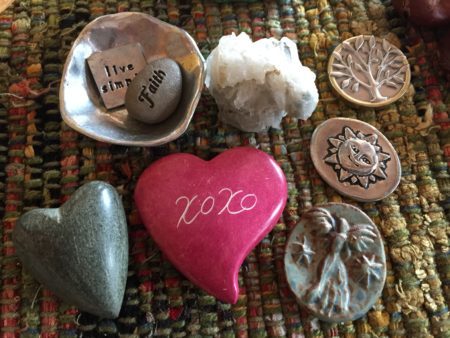 A few weeks ago, I called my son Jack for advice.
A few weeks ago, I called my son Jack for advice.
I’d been invited to California to speak to parents of teenagers, and I was just starting to think about what I could say that might actually be of practical use, especially to parents whose kids are giving them cause to worry. It occurred to me that the best person to consult was my own son, whose challenging adolescence is still fresh and raw in my memory. (I imagine it’s pretty vivid in his memory as well.)
At twenty-four, Jack is sober, self-sufficient, and making a difference in the world. Working full-time as a mentor in a residential treatment center for troubled teenaged girls, he’s been able to transform his own youthful experiences with addiction and recovery into a gift to others who are struggling. Had he not walked this walk himself, he couldn’t extend his hand so whole-heartedly to the young people in his care now. He’s received extensive training on the job, first during a year-long stint as wilderness-therapy counselor and, for the last seven months, as a team member at this therapeutic facility in North Carolina.
But I think he’d agree that his effectiveness at work is as much a product of his own first-hand knowledge as it is a result of his training. In fact, it’s both, in combination with his innate curiosity, his sense of humor, his gift for listening deeply, and his calm demeanor, even when things get tense and crazy. Jack isn’t attached to being right and he doesn’t get flustered, the way we parents so often do. Yet when he speaks of the young women with whom he works, I hear the pride in his voice, especially as he describes moments of growth and change and healing. I couldn’t be prouder of him.
And as it turned out, Jack really was the perfect person for me to call. “I figured you might have some thoughts about how parents can stay connected to their teenagers,” I said. “I do,” he replied. “Every single girl I work with has some kind of conflict with her parents. I think about these kinds of things all the time.”
So I grabbed a pen and a pad of paper. And for the next hour and a half, I scribbled pages of notes. Over the next few days, I sorted through everything he’d said and shaped the hasty notes into complete sentences, combining his words with some of my own. Then I typed it all up under a few simple headings and sent the results to Jack to approve. He wrote back, “Wow, just read over your summary. You put it very eloquently.”
That long, remarkably forthright conversation with my son is one I’ll always remember. I treasured every minute of it and was fascinated by his perspective and insight – both into his own adolescent self and into the dilemmas most of us parents confront. I’m glad he feels I’ve captured the gist of what he said. And I actually learned some things I can still put to good use, even as the mother of two young men who are grown up now and living their own adult lives elsewhere.
If you still have children at home, then perhaps these suggestions from a young man who was himself a struggling kid not all that long ago will help you, too. And so, I share them here, parenting advice from a son who survived his teens despite hitting some hard bumps along the way, along with a few additional thoughts from a mom who spent plenty of sleepless nights staring at the ceiling worrying about what the next day might bring.
I asked Jack, before we hung up, if there was anything I could have done that would have made things better for him, or might have helped us avoid all the trouble we endured through those years. “No,” he said, after thinking it over for a while. “I really think I just had to live through it.” We talked a bit about forgiveness, too, and decided we were on the same page about that: there isn’t really anything to forgive on either side. Each of us did the best we could at the time, working with what we knew, and with what we had, and with who we were. In the end, things worked out.
And perhaps the great irony is that we are both, at this vantage point, grateful for experiences we would have given just about anything to avoid. Neither of us would trade the hard-won gifts of those struggles for some easier, less circuitous path. As Andrew Solomon so wisely points out in his masterful work Far from the Tree, “Life is enriched by difficulty; love is made more acute when it requires exertion.” That said, I wish I’d known then what I know now. So, in that spirit, I offer my son Jack’s thoughts about how parents might live in closer harmony with the complex, evolving, vulnerable adolescents who share their lives. (For ease of writing and reading, I alternate gender pronoun use. My own additions are in italics. )
Be curious.
Every kid is different. Your child is not a younger version of you. He’s not even a variation on a family theme. He is a unique combination of nature and nurture. He is one part happenstance and one part destiny. He’s the astonishing result of one egg and one sperm conjoining at a fortuitous, random moment and forming new life – ie, a combination of genes never seen before and never again to be repeated.
Giving birth doesn’t constitute ownership. It means this unique individual has been entrusted to your care – for a while. Of course as a parent you’ll have more influence on your child than anyone else in his life. And yet, your task is not to shape him, but rather to allow your child to reveal himself to you.
So, pay attention, and start trying to figure out who he might be and what he needs in order to grow and thrive. Approach this challenge with wonder and curiosity. Talk less and listen more. Keep an open mind and an open heart. Recognize the complexity of your child’s nature, the depth of his soul, the mystery of his being here, now, in this home and with this particular family. And put your faith in the messy, miraculous, utterly unpredictable process of growing, unfolding, and becoming.
Ask, don’t tell.
Allow your child to find out the truth of herself for herself. The minute you tell your child what you assume to be true of her, or who you expect her to become, or what you believe she is or is not capable of doing, you deprive her of some of her own necessary, soul-searching exploration. The way you talk to your child becomes her inner voice for life, so choose your words with care.
When you assign her a label – sensitive, wild, artistic, procrastinator, insomniac, over-achiever, under-achiever, athlete, writer, loud-mouth, troublemaker, liar, truth-teller, introvert, extrovert, whatever – you are also assigning her the one-dimensional role she will forever be expected to play upon your family’s stage. This is the same role she will then carry with her into the wider world. Over the years, she will spend lots of unnecessary energy either rejecting that role or trying to live up to it. She’ll fight against it or strive to internalize it. Neither is desirable. A role doesn’t inspire your child’s healthy growth; it just diminishes her real identity.
Give her a name at birth. And then, resist every other impulse to call her anything. Every time you do, you are narrowing, rather than expanding her potential to surprise herself – and you. Instead, ask her what makes her heart soar. Ask her what scares her and what she values above all else. Ask her when she feels safe and what challenges her and who she loves and why. Let her be figure out who she is — in her own time and in her own way. Celebrate these discoveries along with her. Do what you can to keep her safe, and then abide quietly through the hard times, each of which has a lesson to offer. Honor your child’s unique, unpredictable, inevitably painful journey into selfhood.
As Joseph Campell says, “The privilege of a lifetime is being who you are.” Give your child the gift of that privilege.
Seek connection rather than control.
It’s naïve to expect that you can raise your children without having them push you away at some point. Some push much harder than others. How you respond to your child’s pushes – and they may be hurtful, and violent, and shocking — will have a huge impact on the choices he makes down the road, and on what kind of future relationship the two of you have with each other.
Respect your teenager’s need for independence. He is engaged in the hard, necessary, uncomfortable work of developing an independent belief system — his own unique way of viewing the world and learning how to live in it, apart from you.
So, step back gracefully, but don’t step out. In the long run, your relationship will be stronger if you can shift the emphasis from trying to control his behavior to carving out opportunities for deeper connection and understanding. Try relating less to the surface of your child (the hairstyle, the clothes, the make-up, the piercing, the tattoo), and delve down a layer, to a place of real connection. Be his sounding board, not his instructor or his judge. Ask questions, rather than providing answers. Give up your vision of the way things are “supposed” to turn out, and have compassion for his struggle with the way things are: not perfect and not easy and not the way either of you imagined they would be.
Practice benign neglect. Take nothing he says or does personally; it’s not about you. Resist the urge to over-schedule, to over-manage, to over-see. Hold on to your own values, but let go of control. Instead of rules, work together to create agreements. Give him space to experiment, to flounder, to fail, to make mistakes and endure the real-life consequences. Within that space, cultivate trust, faith, and respect for each other. Within that space, lead by example rather than by delivering yet another lecture. Within that space be fully present. Within that space, stay awake, engaged, and quietly attentive. Your child’s job is to push back, and he will find a way to do it. Your job is to love him unconditionally, even while keeping clear boundaries about what’s acceptable and what is not.
Work on yourself, not on your child.
Let go of the ways you thought life and parenthood would unfold. Let go of your plans and dreams and expectations for your child. Let it all go. Save your strength for learning to swim with the tide. The choice to fight what is will result only in more struggle and distance. You can’t change your child.
But you can change yourself. You can change the way you respond to conflict and rejection and disappointment. You can practice mindfulness and steadiness and patience. You can learn the art of detaching with love. You can keep a sense of humor, and use it with kindness, to ease your way through a tough patch. You can take yourself a bit less seriously, and your child’s need for space more seriously. You can figure out how to meet your own needs for approval and fulfillment. Commit to a spiritual practice, to a physical practice, to a gratitude practice. Feed your soul, take care of your body, and reclaim your own purpose and passions. Model self-care and self-possession, rather than over-protectiveness, over-involvement, and fear.
Imperfect doesn’t mean unlovable – you know that, but your teenager isn’t so sure. Admit your own imperfections, and love yourself. Your child will notice and learn from your example.
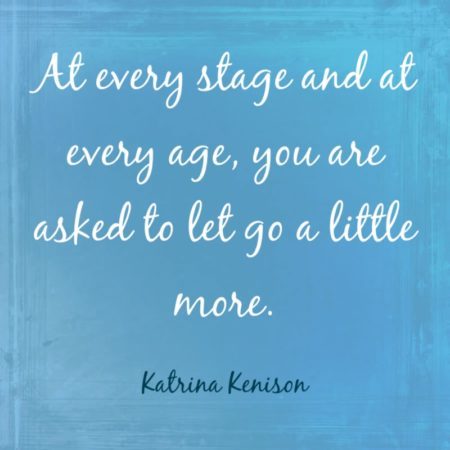 Give your child the gift of failure.
Give your child the gift of failure.
It’s not your task to prepare the world for your child, but rather to help your child grow up to be ready to meet the world. Every time you swoop in to rescue your child, you ease the pain of the moment, but you also deprive her of an opportunity to grow. Heartache is part of growing up. Allow your child to feel the pain life inflicts on her, and to learn from it.
Resist the impulse to smooth the way and solve the problems. Your child needs to experience the trials and tribulations of being human. Every bump in the road is preparation for the much bigger challenges that await. And every time you affirm her resilience and competence by allowing her to stumble, fall, get up, and carry on, you are supporting her growth into an independent, self-confident adult.
Your teenager’s brain isn’t fully wired for adulthood, so she still needs help balancing her ideas and impulses with a rational understanding of cause and effect. Which means you need to find a balance between over-managing her life and allowing her too much freedom too soon.
Your great challenge is to keep providing boundaries and structure that will keep her safe until she’s matured enough to take full control, while still giving her room to experiment and learn her own hard lessons. Her great challenge is to survive, to learn resilience, to learn to trust herself and to love herself, flaws and imperfections and mistakes and all.
At every age and every stage, you are asked to let go a little more. You have to learn that love is always a good choice, but that love doesn’t guarantee your child a safe passage through life. The truth is, you can’t protect your children from accidents of fate or from hurt or from their own private demons. Somehow you must let them go anyway. You must let them go even as you realize that they may come to harm. Even as you know you can’t control their choices or their destinies. Sometimes you must let go even if it means becoming a witness and a bystander to a course that’s self-destructive.
(And here I would add my own mothering question, and an attempt at an answer: What will keep us going through those dark times? Our faith in the rightness of things as they are. Our capacity for unconditional love and forgiveness. Our ability to sustain our belief in our child’s best self. Our knowledge that the only life any of us can save is our own. And the belief that, when the time comes, our young adult child will stand strong and choose a life of meaning and purpose. And that every painful step along the way has been valuable preparation for the step that follows.)
Value effort over achievement. Value process rather than results .
Grades are stressful. The pressure to excel is stressful. The expectation to be special, to win, to stand out, to be the best, is stressful. And these stresses are felt more intensely and more internally by some kids than by others. Not every child’s worth is going to be accurately measured by academic success or athletic prowess or by some obvious talent. So parents have to work with each one of their children to help them develop meaningful definitions of success that fit their temperaments, their passions, their gifts and their challenges. How do you love your child just as he is and, at the same time, help him to become his best self?
You can start by valuing the process of learning rather than the visual evidence of achievement. Your child learns about himself by facing challenges and taking risks, not simply by getting A’s on report cards or by hitting home runs or getting the lead in the school play. Yet, parents put so much emphasis on the A, or the SAT score, or the college admission that they lose sight (and therefore teach their kids to lose sight) of the joy of the process itself, whether it’s reading a thousand-page novel or solving a math problem or playing a musical instrument or being a kind friend.
Pay close attention to what you praise. Don’t heap praise on the grade, or the score, or the artistic merit of the painting or the victory on the field. Instead, take time to recognize and honor the hours your child spent immersed in the pages of the book or drawing the tree outside the window, the effort expended working through the problem, the joy of getting lost in a piece of music and practicing to get it right, the thoughtfulness extended to a friend or classmate.
This takes practice! It means asking yourself moment to moment, What really matters here? The shiny, impressive result that the world can see? Or the quiet, private, unseen effort that went into the work itself? Validate that. Your child may not know how to thank you, but he will be grateful to you for really seeing him as a whole person, rather than as a collection of achievements or failures.
Take the long view. Look for progress, not perfection.
Some kids seem born with a clear sense of their own calling. Some find their paths only by stumbling down some very dark alleys.
Some arrive on the planet with a well-defined sense of responsibility, time management, and organization, while others can’t seem to make their beds, get an assignment done on time, or answer a text.
Some teenagers express their affection easily and will eagerly seek your companionship and approval. And others pull violently away, defy everything you stand for, act as if they don’t care what you think, and insist on defining themselves mainly by being in direct opposition to you.
And although you can say which kid is easier to live with, you can’t say which is better. It’s not even your place to judge. Every kid will wrestle with his or her own unique challenges. They are all finding their way. And you don’t have much to do with it. You can’t force a passion or a path. You can’t choose what your child will love or despise or choose to master. You don’t get to assign to your child the journey you never got to take for yourself, nor can you protect her from repeating the very same mistakes that tripped you up. All you can do is offer them different kinds of experiences, embody the values you believe in, let go of what you can’t control, and love them no matter what.
(And here I can admit: The biggest lesson for me? That I have had a very limited influence on the choices my two very different sons have made, what’s happened to them as a result, and who they’re turning out to be. So I would add that being an involved parent doesn’t mean that you run your child’s life, it means that you support and encourage their efforts to figure things out for themselves, every step of the way.
What I’ve learned over the years is to step back and see the big picture. I look for what IS working, and I give thanks for that. I choose my battles. I don’t sweat the small stuff. I remember where each of them came from, the unique challenges each of them arrived with at birth, how hard they’ve each worked to grow up, and how many obstacles they’ve each surmounted along the way. And even now, I marvel at who they are still becoming.)
Offer the gift of your attention.
Energy flows where attention goes. So, ask yourself, “Where is my attention right now?” One of the greatest gifts you can offer your child is your own willing, undivided attention – even for a few minutes a day. We are a nation of distracted, multi-tasking “do’ers” and driven, insatiable consumers – of social media, of stimulation, and of stuff. We are also addicted to our phones.
But we are losing the art of connecting face to face, heart to heart, in the here and now. Your teenager will be gone before you know it. There is no do-over. Hanging out may feel like a waste of time to you, but deep down your child will appreciate any time you spend that doesn’t come with an emotional agenda attached. It doesn’t mean you should sit and stare at each other; find something to do that allows you to connect and be at ease in each other’s company. Walk the dog or take a drive. Go out to breakfast, chop vegetables and make a meal together, fold the laundry, or eat a bowl of cereal together before bed. Do whatever it takes to carve out a little space of time to just be. Don’t make a big deal out of it; in fact, the opposite. Keep it small and loose and casual. Talk about a tv show you watched, tell him about a problem you’re having at work, ask him what songs he’s listening to these days, what he’s looking forward to, and what he’s feeling stressed about. Let him know you value his presence in your life by being present in his.
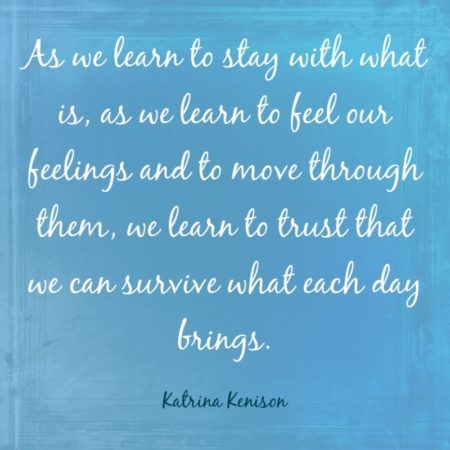 Sit with discomfort.
Sit with discomfort.
The only thing we know for sure is that life will go on challenging us in one way or another. We won’t always get what we want. We will face good days and bad days, comfortable feelings and painful feelings. We will experience stress and grief and disappointment and fear. But we don’t have to numb any of these feelings or run from them. We can simply feel them. And this is a huge lesson for your teenager: namely, that he can survive his feelings, too. Your child, at the mercy of adolescent hormones and emotional storms, will have the temptation to run, to distract, to numb, to tune out. He may turn to drugs, alcohol, food, pornography, or video games as a means of escape.
But every time you can stay with your own difficult feelings, or quietly abide with your child during his hardest moments, you help him learn that he can experience the entire range of human emotion — pain, desire, grief, sadness, anger, jealousy, cravings, frustration—and survive every bit of it.
Only by feeling the full brunt of his feelings and living through them will your child discover that he can weather these emotions after all. He won’t die. He’s not hopeless or unworthy or a loser. And the world won’t come to an end just because he didn’t get what he wanted. Or just because he’s been knocked down or rejected or hurt. As we learn to stay with what is, as we learn to feel our feelings and to move through them, we learn to trust that we can survive what each day brings.
Tell the truth.
Your child can see right through you. So you might as well come down on the side of honesty, even if it’s painful and even if you feel exposed. Be honest about your fears, about your feelings, about your hopes, and about your disappointments. Take off your mask, lay down your shield, and be vulnerable. Share your hurts as well as your joys. Admit it when things are hard. The conversations that make a difference in your child’s life are the ones that are real. Scare tactics don’t work, but honesty does. It helps when you’re willing to acknowledge when things are confusing. And you might as well admit right now that there aren’t always easy black-and-white answers. Be willing to muddle around in the gray area. Invite your child to think with you, rather than trying to think for him.
Delegate.
Never be too afraid or too ashamed to ask for help. It really does take a village to raise a child. As Jack acknowledged during our conversation: “When I was trying to hide my pot use, I really didn’t want to listen to what you had to say to me, but I might have listened to someone else.”
If your words are falling on deaf ears, if the door is shut and communication is at an impasse, then find someone else who can have the hard conversations – someone who’s not attached to any outcome, who doesn’t have any emotional baggage, who will command your child’s trust and respect.
Sometimes, the best thing you can do for your relationship with your teen is to admit that what you’re doing is not working. So swallow your pride and hand some of the care and responsibility for his well-being over to someone who doesn’t have so much at stake. Also, bear in mind that you have no idea who the angel in disguise might be: another parent, a teacher or coach, a therapist, a cop, an ex-con, a former drug addict, a girlfriend or boyfriend who draws a line in the sand, God in the guise of a smashed guard rail on a stormy night, or even a stranger on an airplane. But remember what the Buddhists believe: when the student is ready, the teacher appears. As Jack also said,
No kid ever changed his self-destructive behavior because his parent asked him to, or stopped using drugs because his mom told him they were dangerous. But hearing someone else’s story, or hearing the truth from someone I had respect for, might have made a difference.”
These last two tips are from me, lessons I learned slowly and over time and still practice today.
Choose love over fear.
In every challenging, confusing moment, we have a choice. We can react in fear. Or we can put our faith in love. Usually this means coming to a stop and considering all of the alternatives. Fear will darken and narrow your path. Love will broaden and enlighten it. Fear = grasping. Love = Non-attachment to outcomes. Fear = I need this to be different, I need it to be my way. Love = This is what is. Fear = my child is being a problem. Love = my child is having a problem.
Suddenly, when you choose love, your whole perspective changes. You go from, “How can I change or fix my child?” To, “How can I support my child in this moment?”
So the next time you’re at a loss, ask yourself, Which is the fear-response in this moment? What would a choice made from love look like instead? Sometimes love means saying, “I’m sorry. Please forgive me.” Sometimes it means saying, “I trust you to figure this out.” Sometimes it means admitting, “I really don’t know how to handle this. I’m struggling. I’m doing my best.” Sometimes it means walking away, and leaving your child to sort things out for herself.
Your children will be faced with many obstacles in life, some big and others small. It’s up to you to model a healthy method for how to approach them. You can start with this question, “Will I choose to respond from a place of fear or from a place of love?”
Seize joy.
There are no charmed lives. But there are charmed moments, even in the midst of the most difficult days. Don’t let them slip by unnoticed. If you can’t resolve the chaos, find beauty and happiness amid the mess. Celebrate the simple pleasures and the modest delights of ordinary life. Uphold the small, silly and sweet traditions and the dumb jokes and the old sayings and routines that make your family your family. Do good deeds. Laugh whenever you can. Diffuse tension with humor, hurt feelings with hugs, anger with forgiveness. Reweave connections with kindness. This is what you are really here to do, for your own sake and for your children: Love them for who they are, as they are, in this moment and for just as long as you can.
What have we missed? Does your parenting journey continue to yield new lessons? I’d love to hear.
The post parenting advice
from a 24-year-old son appeared first on Katrina Kenison.
February 15, 2017
an oasis of silence
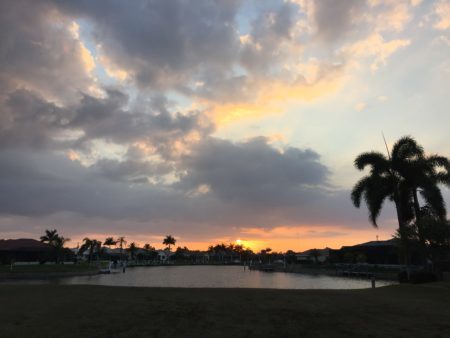 We need to recover an oasis of silence within the rhyme and reason of our active life, for it is in the silence that we meet the face of God. ~ Max Picard
We need to recover an oasis of silence within the rhyme and reason of our active life, for it is in the silence that we meet the face of God. ~ Max Picard
It is still dark as I type these words. The sliding doors of the guest room at my parents’ house in Florida are open to warm night air, the rolling sounds of distant traffic, the first low laments of mourning doves. For the last week my mom and I have been alone here together. Our plan when we arrived was to spend these precious days taking walks, reading our books (I ambitiously mailed myself a whole box from home), exercising, making healthful meals and enjoying each other’s company.
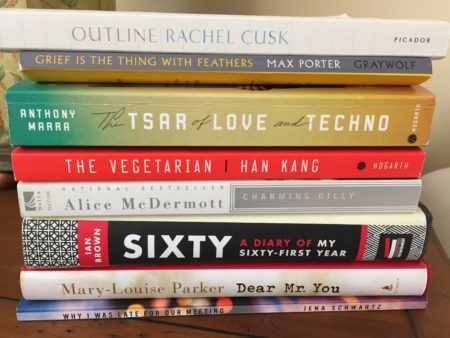 We’ve done some of that. But in all honesty, we’ve been distracted from our modest intentions. The drama playing out in Washington has overshadowed too many waking hours. Instead of immersing myself in the novels on the bedside table, I succumb to the pull of three or four different newspapers and magazines on line. In years past, my mom and I would spread craft supplies out on the table and create home made cards and tiny hand-sewn books with leather covers. This year, we’ve been sharing articles and posts from our Facebook and Twitter news feeds. And watching Colbert and Saturday Night Live clips. And making phone calls to senators and representatives. And signing petitions. And donating money. (And, as I mentioned here last week, not sleeping all that well.)
We’ve done some of that. But in all honesty, we’ve been distracted from our modest intentions. The drama playing out in Washington has overshadowed too many waking hours. Instead of immersing myself in the novels on the bedside table, I succumb to the pull of three or four different newspapers and magazines on line. In years past, my mom and I would spread craft supplies out on the table and create home made cards and tiny hand-sewn books with leather covers. This year, we’ve been sharing articles and posts from our Facebook and Twitter news feeds. And watching Colbert and Saturday Night Live clips. And making phone calls to senators and representatives. And signing petitions. And donating money. (And, as I mentioned here last week, not sleeping all that well.)
A few minutes ago, when I switched on the bedroom light and reached for my laptop, this quote about silence was the first thing I saw. It arrived at the top of an invitation to a contemplative retreat. The words leapt out — an oasis of silence. I wanted to sign up immediately.
I can’t run away to that small wooden cabin in the woods. But I am here for one more week, in a quiet house by a quiet canal in a neighborhood where, it seems, most of the neighbors are staying north for the winter. I’ve got no real obligations other than to be good company for my mom and prepare some talks to give next month. There’s nothing to stop me from creating my own oasis of silence right where I am.
Perhaps you’re ready for a break, too.
In phone conversations with friends over these last days I’ve noticed a creeping sense of exhaustion and overwhelm. We are all deeply concerned about the country. We are also tired and sad, embarrassed and anxious. We’re having a hard time focusing on the present moment, or getting work done, or even committing to plans for the future. As one friend confessed the other morning, “I just don’t wake up with the same sense of joy and optimism about the day that has always been such a part of who I am, and of my life here.”
My friend happens to actually live alone in a remote wooden cabin. Full of books and plants and artwork, her home is nestled into a hillside and surrounded by a magical garden — a sanctuary not just for her, but for all the wild creatures with whom she shares it. What she has created there really is an oasis of silence, an oasis fed by a spring of joy. These days, she admits, the spring is more of a trickle.
As citizens of the larger world, we are all struggling. How many checks must one write to the Natural Resources Defense Fund before one can step into the backyard and look a beloved old apple tree in the eye? How many phone calls to a Senator does it take before you feel you’ve done your civic duty for the day and are free to go to the movies or take a walk with a friend? Can a blog essay published or an article shared on Facebook create an authentic experience of opening and empathy, or are we just bouncing all these words around in an echo chamber of our own creation? How do we connect with those who hold different views of our problems? How do we begin to work together toward possible solutions? I haven’t found anyone yet who’s come up with a definitive answer to such questions. We are all finding our way.
After the election, The New York Times was so inundated with accounts of hate crimes and harassment occurring across the country that they began gathering the stories into a weekly round-up under the heading This Week in Hate. These are things I would rather not know about. At the same time, I feel a sense of responsibility; it is my duty, as an American, to know what cruelties my fellow Americans are inflicting upon each other. And, too, how my fellow Americans are suffering at the hands of their neighbors.
I used to love opening my email to find notes in my inbox from readers eager to share the parallels and synchronicities in our lives. These days, I click open notes from strangers not with joy, but with dread. Many of them are cruel and accusatory: “You’ve become unhinged.” “What happened to make you so hateful?” “You should stop writing and pray to God to clean your mind.” “Unsubscribe me.” These are just emails, silent messages that I can respond to with civility and then delete. But they do serve a purpose. They deepen my empathy. If a few angry emails cause my mouth to go dry and my heart to pound, I can only imagine how it must feel to awaken to find your tires slashed and a swastika on your car windshield, or feces dumped in your yard, or hateful words scrawled across your driveway. I can only try to imagine the terror of having your front door broken down at 4 a.m. by a team of customs agents emboldened to arrest first and ask questions later.
Here in Florida, where every repairman, construction worker, garbage man, and yard crew I encounter is clearly from somewhere else, I make it a point to wave, to smile, to say hello. It doesn’t feel like much. In fact, nothing I could possibly do would ever be enough. I know that’s part of what’s troubling me, this sense of helplessness. No matter how much any one of us reads, posts, calls, marches, meets, tweets, or donates, it’s not ever going to feel like enough.
But there’s another hard truth that’s also begun to sink in. What we’ve got here is not some passing crisis in the White House, but a long road that’s already irrevocably transformed the assumptions we make about our government, our security, and our daily lives, both as individuals and as a nation. We must stay engaged and informed. We must find ways to show up, speak up, and reach out. But we must also pace ourselves. We must rest. We must clear a space in our days for quiet. We must take time to think and to reflect, not just react in despair or outrage to the latest headlines. We must, in the words of writer Cheryl Strayed, be sure to “put ourselves in the way of beauty.” We must remind each other of our optimism. And our goodness. We must feed our souls and nurture our spirits so that we can continue to serve as ambassadors of peace and healing in the world.
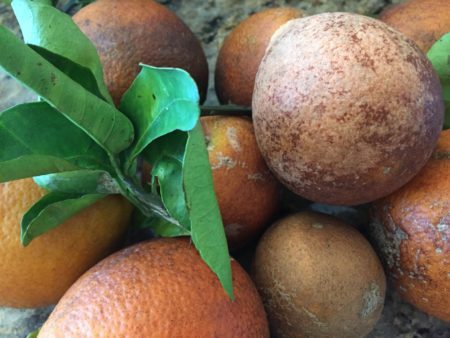 Today, here, I am stepping into an oasis of silence. I’ll squeeze oranges for breakfast. I will go out for a walk and listen to the wind tossing the palms. I’ll sit in the shade and finish reading the collection of almost unbearably beautiful short stories I began last night. I’ll talk to my children and husband on the phone and do some yoga and make dinner for my mom. I’ll leave the TV off and the newspaper untouched. I’ll put myself in the way of beauty.
Today, here, I am stepping into an oasis of silence. I’ll squeeze oranges for breakfast. I will go out for a walk and listen to the wind tossing the palms. I’ll sit in the shade and finish reading the collection of almost unbearably beautiful short stories I began last night. I’ll talk to my children and husband on the phone and do some yoga and make dinner for my mom. I’ll leave the TV off and the newspaper untouched. I’ll put myself in the way of beauty.
 I hope you’re taking gentle care of your own soul today, too. Together, we can do this. In the meantime, let us not forget the value of being still, of being awake, of being fully present both to pain and uncertainty. We are learning how to resist, but we are also learning how to sit with our discomfort. And we have little choice but to open our hearts to mystery, in faith that there are forces at work in the world that are far greater than our human failures and fumblings.
I hope you’re taking gentle care of your own soul today, too. Together, we can do this. In the meantime, let us not forget the value of being still, of being awake, of being fully present both to pain and uncertainty. We are learning how to resist, but we are also learning how to sit with our discomfort. And we have little choice but to open our hearts to mystery, in faith that there are forces at work in the world that are far greater than our human failures and fumblings.
Nothing we can do will be enough. Whatever we are able to do, may it be enough.
Silence creates possibility – the possibility of hearing. What we learn to do in silence is create within ourselves silence, to create within ourselves emptiness, to brush aside all words, all concepts, all feelings, all fantasies, all anxieties, all ambition – gently to brush away all these things that seem so important – to let them go and to empty ourselves so that if the word is spoken, we may hear it, and if the song is sung, we may attend.
In silence we do not try to be anything or anyone. We give up trying to be and simply are. We become being. Or, to put it another way, we become nothing in order to become that which we truly are.”
~ Carl Scovel
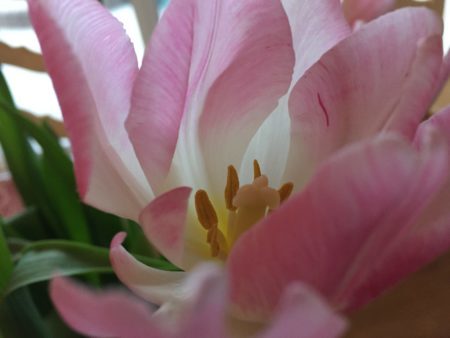 A heartfelt thank you to all who read and commented last week. And congratulations to Jeanne and Kathleen, winners of the two hand-felted hearts by my artist friend Elizabeth Stubbs. If you would like to support her ACLU fundraiser or see more of her work, visit her Etsy shop here.
A heartfelt thank you to all who read and commented last week. And congratulations to Jeanne and Kathleen, winners of the two hand-felted hearts by my artist friend Elizabeth Stubbs. If you would like to support her ACLU fundraiser or see more of her work, visit her Etsy shop here.
The post an oasis of silence appeared first on Katrina Kenison.
February 7, 2017
how is your heart today?
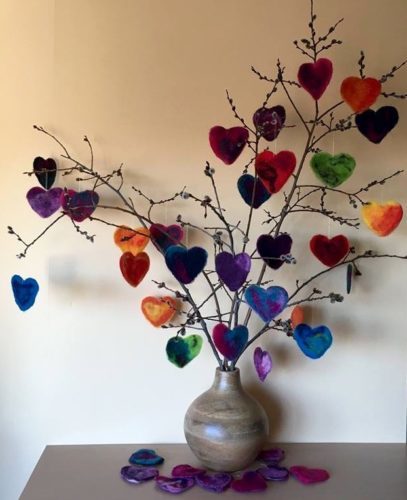 It is still dark, not yet five, too early to be awake. But here I am, eyes wide open. It’s a new habit, this four a.m. restlessness blossoming into a low-grade anxiety that makes going back to sleep impossible. But this morning, oddly, it’s a question that nudges me to consciousness:
It is still dark, not yet five, too early to be awake. But here I am, eyes wide open. It’s a new habit, this four a.m. restlessness blossoming into a low-grade anxiety that makes going back to sleep impossible. But this morning, oddly, it’s a question that nudges me to consciousness:
How is your heart today?
I lie in bed for a while, taking stock. How is my heart? There’s no easy answer. And so I try to remember, instead, where I first heard or read these provocative, tender words. In a book? A conversation? A blog post?
More curious now than sleepy, I turn on the light, reach for my glasses and phone, and Google the words “How is your heart today?” The first link that pops up jogs my memory: a beautiful essay from the OnBeing website entitled “The Disease of Being Busy,” which I read quite a long time ago. In it, columnist Omid Safi, wonders:
Whatever happened to a world in which kids get muddy, get dirty, get messy, and heavens, get bored? Do we have to love our children so much that we over-schedule them, making them stressed and busy — just like us?
What happened to a world in which we can sit with the people we love and have slow conversations about the state of our hearts and souls, conversations that slowly unfold, conversations with pregnant pauses and silences that we are in no rush to fill?
These lines made a deep impression on me. Don’t we all hunger for breathing room, for peace, for solitary reflection and, also, to be seen and understood? Doesn’t every heart long for the kind of quiet, one-on-one conversations that allow time and space for vulnerability, intimacy, and soul connections that run deeper than words?
I’d recognized in Omid Safi a kindred spirit — a thoughtful husband and father, a busy university professor, and also a writer who invites us to slow down and to pay attention to what matters. “We know what we want,” he suggests. “A meaningful life, a sense of community, a balanced existence. . . .We want to be truly human.” These, of course, are the very ideas upon which I strive to build my own life.
Still, when I see the date on the essay — November 2014 — I’m a bit taken aback. I can’t help but think how very different the world I’ve awoken to today is from the world most of us took for granted just two years ago when this essay was published. Two years ago, our country was not yet swept up in the bruising presidential campaign and election that has led us to this moment – a moment in which, if the president’s travel ban is upheld in court, Omid Safi, a Muslim and the director of Duke University’s Islamic Studies Center, would not be allowed entry to the United States.
I do not think it is a random thing that my unconscious mind has nudged me awake this morning with an inquiry about the state of my heart. And so it comes as no great surprise when I reach the end of Omid Safi’s essay and find that the quote I’ve come in search of has its origins in Muslim cultures. Safi explains that when you want to know how someone’s doing, you would ask, in Arabic, “Kayf haal-ik?” Or, in Persian, “Haal-e shomaa chetoreh?” How is your haal?
“What is this haal that you inquire about?” he continues.
It is the transient state of one’s heart. In reality, we ask, ‘How is your heart doing at this very moment, at this breath?’ When I ask, ‘How are you?’ that is really what I want to know.
I am not asking how many items are on your to-do list, nor asking how many items are in your in-box. I want to know how your heart is doing, at this very moment. Tell me. Tell me your heart is joyous, tell me your heart is aching, tell me your heart is sad, tell me your heart craves a human touch. Examine your own heart, explore your soul, and then tell me something about your heart and your soul.
Soon it will be Valentines Day. We will send cards and candy and flowers to our loved ones. But perhaps Valentines Day this year offers us an opportunity to go deeper than usual. What would happen if we were to ask ourselves, and each other, a question that requires a little more time and a lot more courage to answer: How is your heart doing at this very moment?
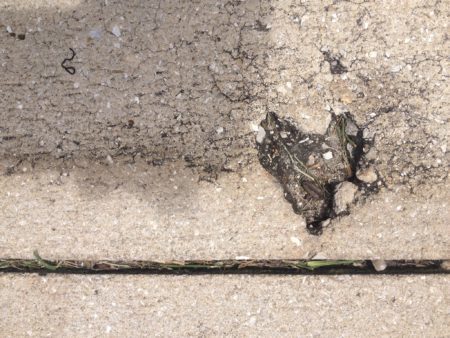 The truth is, my own heart, these days, is often heavy. The words sad and fearful come to mind. Disbelief and shock are in there, too, although as the days pass I’m a little less surprised by each new political low and a little less shocked by the rapidly accumulating assaults on our democracy. The belligerent, false, and cynical have all too quickly become commonplace. And what was once unimaginable has swiftly become our new reality: a country in which the president lies to the people, threatens the press, insults judges who test the legality of his executive orders, and courts favor with Russia as he insults our longtime friends and allies. The list goes on.
The truth is, my own heart, these days, is often heavy. The words sad and fearful come to mind. Disbelief and shock are in there, too, although as the days pass I’m a little less surprised by each new political low and a little less shocked by the rapidly accumulating assaults on our democracy. The belligerent, false, and cynical have all too quickly become commonplace. And what was once unimaginable has swiftly become our new reality: a country in which the president lies to the people, threatens the press, insults judges who test the legality of his executive orders, and courts favor with Russia as he insults our longtime friends and allies. The list goes on.
Like some who have confessed themselves too exhausted or too depressed to keep resisting the chaos of loss and destruction, I, too, have been tempted this week to shut off the news, to ignore the latest round of threats and falsehoods coming from the Capitol, and to go about my own private business in the hope that America’s dangerous new course will somehow be set to rights.
But there is a glimmer of something else in my heart, too, something more powerful than despair. Something which refuses to be extinguished. I’m not even sure what to call it – some combination of responsibility and faith and hope.
This small, true flame is the one I want to nurture and feed. This flame – call it kindness if you will, or compassion — is what makes me me. It is what keeps me committed in the face of confusion and defeat. And it is what reminds me that to care for my own heart is to care for every other bruised and beating human heart as well.
 If the last few weeks have given us a taste of some previously unthinkable “new normal” in our country, then we are also realizing that it’s up to each and every one of us to examine our own hearts with more courage and resolution than ever before. A few days ago my friend Claudia Cummins shared these wise and timely words by Buddhist teacher Jack Kornfield:
If the last few weeks have given us a taste of some previously unthinkable “new normal” in our country, then we are also realizing that it’s up to each and every one of us to examine our own hearts with more courage and resolution than ever before. A few days ago my friend Claudia Cummins shared these wise and timely words by Buddhist teacher Jack Kornfield:
There is a fundamental nobility and dignity to all human beings. In your own way, your practice is to find this nobility and freedom in yourself, and honor it in others. When fear and untruth guide us individually or collectively, they lead to suffering for all. The dharma offers another, wiser way to live.
Now is the time to practice, to steady your mind and open your heart. Then listen to your deepest values and find your own unique way to embody and stand for them. The world needs your wisdom and care, your compassion, your clarity and courage.
This then, must be our practice now. And as we settle in for the long haul, why not take our cues from the stories of ordinary men and women all over the country who are embodying these values, whose words and deeds do much to honor the nobility and dignity of all human beings?
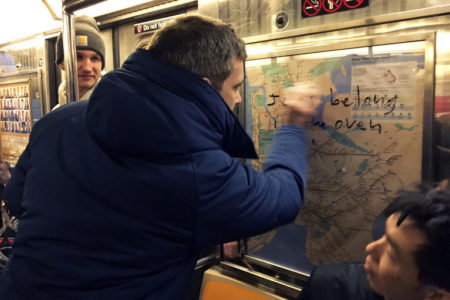 I’m inspired by the New York subway riders who used hand sanitizer from their purses and pockets to scrub clean a car defaced by swastikas and hateful words. By the Jewish congregants in a small Texas town who offered their Muslim neighbors the keys to their synagogue when the local mosque was destroyed in a fire. By the Jewish and Muslim dads whose children met and shared a smile at a protest at O’Hare airport. By the Juilliard students who responded to a church group’s protest against the “vanity of the arts” by playing their violins for the protesters who had come to taunt them. By the lawyers who showed up in droves to offer assistance to refugees who were stranded in our nation’s airports when Donald Trump’s travel ban went into effect. And by the suburban synagogue members who gathered at O’Hare with signs and roses and warm coats to welcome some of the last Syrian refugees allowed into the country.
I’m inspired by the New York subway riders who used hand sanitizer from their purses and pockets to scrub clean a car defaced by swastikas and hateful words. By the Jewish congregants in a small Texas town who offered their Muslim neighbors the keys to their synagogue when the local mosque was destroyed in a fire. By the Jewish and Muslim dads whose children met and shared a smile at a protest at O’Hare airport. By the Juilliard students who responded to a church group’s protest against the “vanity of the arts” by playing their violins for the protesters who had come to taunt them. By the lawyers who showed up in droves to offer assistance to refugees who were stranded in our nation’s airports when Donald Trump’s travel ban went into effect. And by the suburban synagogue members who gathered at O’Hare with signs and roses and warm coats to welcome some of the last Syrian refugees allowed into the country.
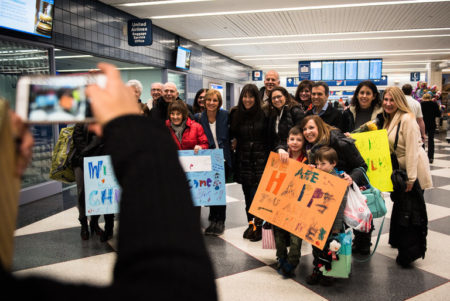 Isuspect that, if asked why they stepped up, every single one of these men and women and students and children would say what one of the subway riders expressed: “We were just being decent human beings.”
Isuspect that, if asked why they stepped up, every single one of these men and women and students and children would say what one of the subway riders expressed: “We were just being decent human beings.”
However, we can’t afford to take such decency for granted. For, just as thousands of citizens were protesting Donald Trump’s travel ban, there were “ordinary” men and women who were executing it – with a lack of caring that offers a chilling reminder that, to quote the Baltimore Sun, “No would-be autocrat can act alone. As a practical matter, he needs subordinates willing to carry out orders.”
And so I read verified reports of a five-year-old child being taken from his mother and hand-cuffed as a “security threat,” of an elderly woman detained without food for twenty hours, of another detained for over thirty-three hours and denied use of a wheelchair, and I have to examine my own heart yet again. Painful as it is, we must acknowledge that this, too, can happen here. And that, as the Sun pointed out, “If we do nothing, that is a choice. It means we accept a government that has demonstrated it is capable of inflicting cruelty on the innocent and defenseless.”
My heart is telling me to make a different choice. I invite you to do the same. May we commit to steadying our minds and opening our hearts. May we listen for our deepest values and find our own unique ways to embody and stand for those values. May we be kind. May we be clear. May we be brave.
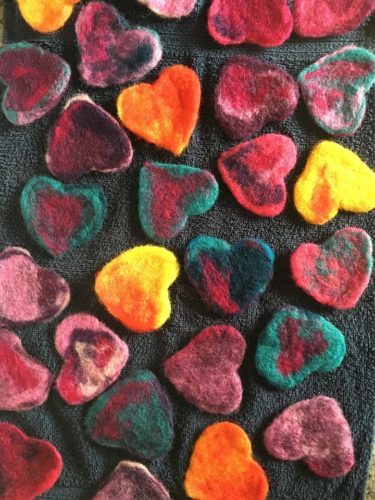 In this spirit, an artist friend has launched a “heartfelt” fund-raiser for the ACLU. She is working tirelessly to create beautiful hand-felted hearts for Valentine’s Day – and she is donating all the monies raised from her efforts to the ACLU. I’m delighted to share her work with you and have made a donation in honor of you, my readers. Which means I have two lovely hearts crafted by Elizabeth Stubbs to give away.
In this spirit, an artist friend has launched a “heartfelt” fund-raiser for the ACLU. She is working tirelessly to create beautiful hand-felted hearts for Valentine’s Day – and she is donating all the monies raised from her efforts to the ACLU. I’m delighted to share her work with you and have made a donation in honor of you, my readers. Which means I have two lovely hearts crafted by Elizabeth Stubbs to give away.
To enter to win, just leave a comment below. I will draw two names at random on Tuesday, February 14. My small Valentine’s Day gift to you — and to those working to support civil liberties for all.
So tell me, How is your heart today?
here is the deepest secret nobody knows
(here is the root of the root and the bud of the bud
and the sky of the sky of a tree called life; which grows
higher than soul can hope or mind can hide)
and this is the wonder that’s keeping the stars apart
i carry your heart (i carry it in my heart)
~ e.e. cummings
The post how is your heart today? appeared first on Katrina Kenison.
January 27, 2017
activism for introverts
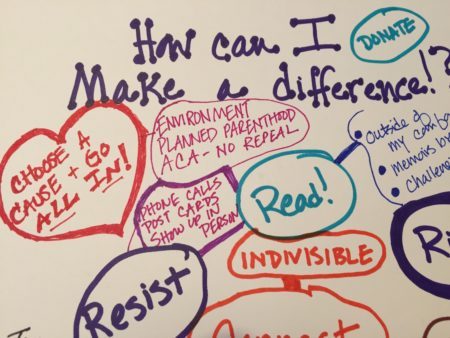 When I began writing here in 2009, I was feeling my way. I did not have a Facebook page or a Twitter account or a smartphone and, for a private person like me, the idea of creating personal content to post online was somewhat terrifying. My earliest blog posts were done at the request of my New York publisher, to help create a social media presence that might result in a few additional sales for the memoir I’d just written about being the mother of teenagers. Although the word “platform” wasn’t part of my lexicon, my twenty-six-year-old publicist told me I needed one. And so, with the help of my then college-age son Henry, this website was born. I had no real plan, other than to write about whatever gifts and challenges my own daily life handed me and to see how things went.
When I began writing here in 2009, I was feeling my way. I did not have a Facebook page or a Twitter account or a smartphone and, for a private person like me, the idea of creating personal content to post online was somewhat terrifying. My earliest blog posts were done at the request of my New York publisher, to help create a social media presence that might result in a few additional sales for the memoir I’d just written about being the mother of teenagers. Although the word “platform” wasn’t part of my lexicon, my twenty-six-year-old publicist told me I needed one. And so, with the help of my then college-age son Henry, this website was born. I had no real plan, other than to write about whatever gifts and challenges my own daily life handed me and to see how things went.
One thing I was pretty certain about was that I wouldn’t delve into either religion or politics in public. For one thing, my intention at the time was to build a community of readers – and there’s no better way to lose a friend or a fan than to stir up the waters of dissent and disagreement on divisive topics such as God and elected officials. Besides, I’m inherently averse to conflict. Why ruffle feathers, when I could try instead to simply please everyone who happened to find their way to my website? Within the broad scope of “the gift of an ordinary day” I could offer a rumination about making applesauce in autumn, an anecdote about my sons, reflections about growing older or letting go, a few photographs of the peonies in my garden. These were the things I most loved writing about anyway. And with every post I was speaking as much to myself as to anyone else, reminding myself to be present, to be grateful, to pay attention.
As the years went by and this circle of readers grew, we also came to trust each other. I took a few deep breaths and shared some pretty tough stuff here, painful personal stories of loss and grief, and then was overcome by the responses I received in return. Week after week I was moved and uplifted by the comments that arrived in my in-box – words offered in solidarity and friendship, words of compassion and wisdom, words of generosity, eloquence, and hope. Here, through both our reading and our writing, we held each other up through good times and hard ones.
Last summer, as the national conversation swirling around the presidential election heated up, I faced a decision. I could carry on writing pieces without any reference to the political drama unfolding in our country. Or, I could share my grave concern about the possibility that Donald Trump would become our 45th president.
There was a part of me that was tempted to stay silent: Better not write about my own fears or the values I care about, or some people may not like me anymore. But in the end I couldn’t do it. To ignore what was uppermost in my mind and heart seemed disingenuous and false and cowardly. In the words of Senator Cory Booker, “In the cause of justice, never remain silent just so that others may remain comfortable.”
I know that one small voice on one small blog doesn’t make a difference in anyone’s big picture. And yet, I also believe that one person’s silence speaks volumes.
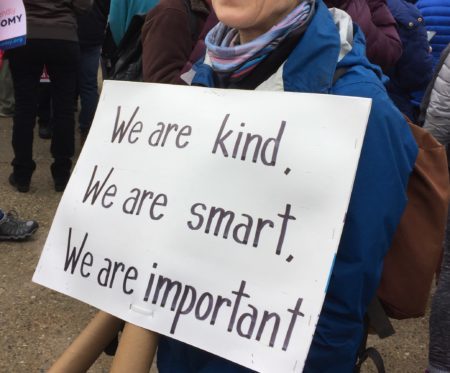 Much as I would love to be sharing a winter soup recipe today and the good news of a son’s acceptance to grad school, I’m here instead to write the second part of this piece I began last week about how we might find ways to show up and speak out – something I never dreamed I would be doing. And I think it’s worth saying that speaking up is not the same as whining, as some have suggested. Donald Trump is the president and I do accept that; I have no choice. But Donald Trump’s words and deeds have turned me, and so many others, into activists.
Much as I would love to be sharing a winter soup recipe today and the good news of a son’s acceptance to grad school, I’m here instead to write the second part of this piece I began last week about how we might find ways to show up and speak out – something I never dreamed I would be doing. And I think it’s worth saying that speaking up is not the same as whining, as some have suggested. Donald Trump is the president and I do accept that; I have no choice. But Donald Trump’s words and deeds have turned me, and so many others, into activists.
If you’re here reading this essay, then my guess is that you, too, are in a place you didn’t ever expect to be – trying to find your way in a new American landscape in which politics has never felt more personal. As concerned citizens of a country we all love, it’s become nearly impossible to separate the two. To voice our concern about what’s happening in our nation at this moment is not “hateful,” as one reader suggested, it’s human.
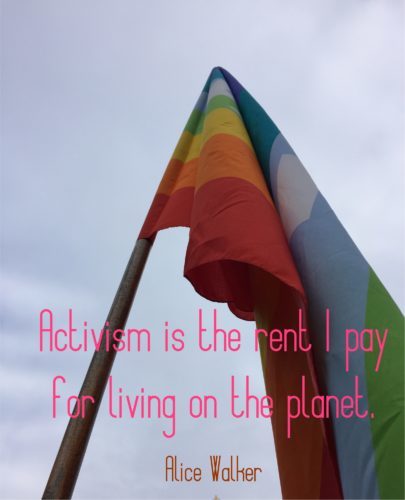 And yet, perhaps naively, I continue to hope that we can all agree on the basic values of civility and kindness, tolerance and empathy, honesty and fair play. I hope we can share our political views and concerns and trust them to be received with the same kind of respect given to our stories of personal challenges or our concerns about our children. Unfortunately, that kind of common courtesy and respect for our differences has not been much in evidence in the White House over the last week. So perhaps it’s little wonder that we’ve seen a decline in basic manners in our daily discourse as well. My guess is that just about every one of us has had some painful experience of reckoning and backlash as a result of speaking out in recent weeks. And yet, day-by-day and conversation-by-conversation, circumstances are requiring us to become both braver speakers and better listeners.
And yet, perhaps naively, I continue to hope that we can all agree on the basic values of civility and kindness, tolerance and empathy, honesty and fair play. I hope we can share our political views and concerns and trust them to be received with the same kind of respect given to our stories of personal challenges or our concerns about our children. Unfortunately, that kind of common courtesy and respect for our differences has not been much in evidence in the White House over the last week. So perhaps it’s little wonder that we’ve seen a decline in basic manners in our daily discourse as well. My guess is that just about every one of us has had some painful experience of reckoning and backlash as a result of speaking out in recent weeks. And yet, day-by-day and conversation-by-conversation, circumstances are requiring us to become both braver speakers and better listeners.
If we were not activists before, we are realizing we must become activists now. We are finding ourselves moved to do what feels right, rather than settling for what’s easy. We’re making choices that reflect our best selves and our highest aspirations for our country, rather than giving in to our darkest fears. But it feels important to acknowledge that these fears are not groundless. In just a few days in office, the president has taken executive actions that threaten civil rights, free speech, national parks, health care, women’s rights, immigrants, LGBT rights, voting rights, and, with his silencing of the Environmental Protection Agency, the very planet we call home. The possibility of a tweet-triggered nuclear war is enough to keep many of us awake at night, wondering whom, if anyone might rein him in before he does us in.
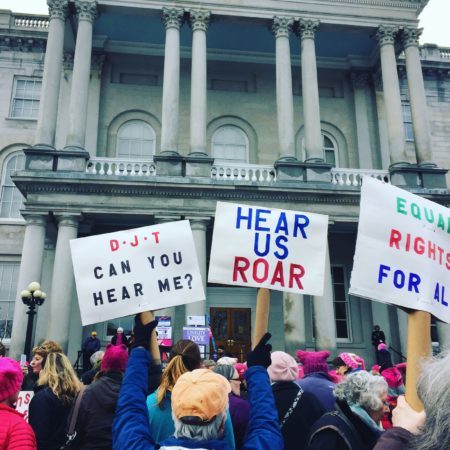 In the past, my quiet temperament has kept me on the sidelines of most organized political efforts. But last Saturday, I knew exactly where I needed to be: outside in front of the state house here in New Hampshire with a group of friends and 5,000 other human beings who are committed to supporting our fragile civil liberties, our basic rights as citizens and, most important of all, the earth itself.
In the past, my quiet temperament has kept me on the sidelines of most organized political efforts. But last Saturday, I knew exactly where I needed to be: outside in front of the state house here in New Hampshire with a group of friends and 5,000 other human beings who are committed to supporting our fragile civil liberties, our basic rights as citizens and, most important of all, the earth itself.
And then, my heart full with all the personal stories I’d heard, I came home from that inspiring, empowering day and wondered, “Now what?”
I have no idea if it’s possible for us to make a difference. What I do know is that I can’t live with myself if I don’t at least try. Over the last week or so, along with millions of other concerned Americans, I attempted to carry on some semblance of normal life while absorbing each day’s bleak news. I also sought ways to offer constructive, peaceful responses to a president and administration I find increasingly combative and disturbing.
Like you, I’m learning as I go. I keep reminding myself: I can’t do everything, but I must do something. So, in the spirit of our shared desire to move forward with hope and through good work, here’s some of what I’ve figured out so far.
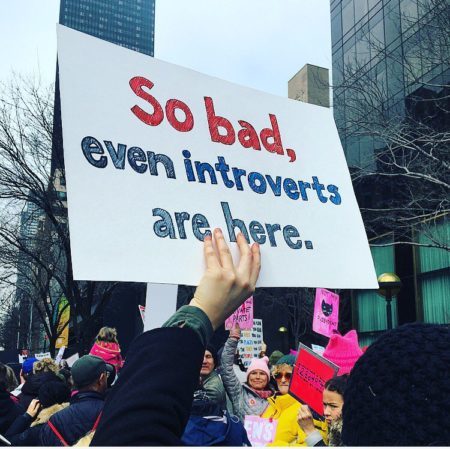 The 5 R’s of Activism for Introverts.
The 5 R’s of Activism for Introverts.Read.
“A reader lives a thousand lives before he dies. The man who never reads lives only one.”
~ George R. Martin
The man in the White House is leading only one life. We owe it to each other to lead many more than that. Now more than ever, I want to be informed, to see things from different angles, to stay abreast not only of events as they unfold, but also of their potential repercussions. For years, my daily sources for news and in-depth news analysis have been The New York Times and The New Yorker. (The New Yorker is my home page, so it’s the first thing I see when I turn on my browser.) Since the election, I’ve also been reading The Guardian and The Nation online. Bill Moyers sends out a free daily newsletter with links to a wide-ranging round-up of articles about current events gathered from independent sources.
I draw much nourishment and inspiration from the writings of other women on the path, and I especially appreciated posts this week by Karen Maezen Miller, Nancy King Bernstein, and Gretchen Staebler. If you’ve wondered just why it’s so hard for everyone to be on the same page, this essay helps explain.
But one thing we can probably all agree on is that in the midst of such chaos, it serves us and our country if we take time to read more widely and more deeply. As one Women’s March sign in New Hampshire said, “Make America Think Again.”
Reconnect
“A dream you dream alone is only a dream. A dream you dream together is reality.” ~ John Lennon
I’ve never forwarded a chain letter in my life and am not a fan of group emails. But desperate times call for desperate measures. Now is the moment to reweave sturdier connections with friends near and far. Go through your address book, create an email list, and send out a feeler. Ask your friends if they’d like to receive more emails from you containing articles, essays, and/or suggestions for their own activist to-do lists. Many people do want to learn more and to get involved, they just aren’t sure how.
Join your local Indivisible group, or start one in your town.
By the time Trump took office, a smart, motivated group of Congressional staffers had already created this practical, boots-on-the-ground manual with advice for organizing and resisting his agenda. Since December it’s been downloaded over a million times, and over 4,500 local groups have formed and registered. You can download the whole manual for free. Go to the Indivisible website to find out if there’s an existing group near you.
Where I live, we have two. Both meet weekly and maintain active Facebook pages with daily updates, phone numbers and addresses, and “marching orders.”
Cultivate community by hosting monthly neighborhood dinners. Invite your fellow activists and keep each other fed and inspired. Or, invite everyone and agree to work together to find common ground and to double-down on such bi-partisan issues as working to get big money out of government by repealing Citizens United. (To learn more about that effort, start here: American Promise.)
What ever you do, don’t run away from the hard conversations. Turn toward them. Soften. Hold your ground. Listen. Speak your truth. Listen some more.
Reward.
“We make a living by what we get. We make a life by what we give.” ~ Winston Churchill
We all want to support good work in the world. At the same time, the amount of need and the number of organizations trying to meet those needs is enough to make your head spin. I could drive myself crazy signing every petition that comes through my inbox and sprinkling small feel-good donations far and wide.
I do sign the petitions – it can’t hurt. But to stay sane, I’m trying to focus my energies and resources in just a couple of places. What matters most to you? For me, it’s the ACLU, which is working tirelessly to keep legal pressure on the Trump administration for transparency (and his tax forms), and Planned Parenthood, which is being defunded by the GOP. But the environment and the health of the planet is, by many measures, the most urgent cause of all. There are many groups dedicated to saving the earth. They all sound worthy, so where will our money have the most impact? Here, from Outside and Earth Easy, two links that help answer that question.
Don’t have room in your budget for donations of any size? You can still support good causes with your dollars. Instead of buying a gift for a birthday or holiday, make a donation in that person’s name to a cause they care about. Or, if you really need something to wrap up — a shower gift for a new baby, a birthday present for Uncle Phil — or even some new T-shirts for the gym, head to the online shops of the causes you care about. There you’ll find everything from onesies for the babe to coffee mugs, tote bags, and apparel that proclaims your support. Try these for starters: the ACLU, Planned Parenthood, Greenpeace.
There are lots of creative ways to support positive change that don’t drain your bank account, and many ways to reward those who are out on the front lines doing good work in the world. Gifts of time, food, transportation, or childcare for those who are testifying, marching, or traveling to rallies and meetings – all are appreciated and strengthen our community.
Resist.
“Never doubt that a small group of thoughtful, committed, citizens can change the world. Indeed, it is the only thing that ever has.” ~ Margaret Meade
This really is the crux of it.
You can begin right here, with Jenifer Hofman’s weekly Action Checklist for Democrats, Independents, and Republicans of Conscience. Jenifer provides clear instructions for actions you can take from home to support freedom and equality for all Americans. Her tent is big. She features lots of other good stuff there, too. Sign up for weekly newsletters full of both inspiration and instruction.
This week, I was just one of thousands of people who were making phone calls and writing letters to the White House, to our senators and representatives, and to state and local officials. Our democracy depends on communication between its citizens and its leaders. Just days into the new administration, many of these avenues of communication have been quietly shut down. And yet, we must not go silent ourselves. Let’s continue to speak up, and to have faith that our voices, joined, will be heard.
Respect.
“We are sun and moon, dear friend; we are sea and land. It is not our purpose to become each other; it is to recognize each other, to learn to see the other and honor him for what he is: each the other’s opposite and complement.” ~ Hermann Hesse
It feels more important than ever to honor and uphold the values we teach our children and by which we live our lives. When our leaders aren’t modeling integrity or valuing the qualities we try to cultivate in ourselves, then we just have to work harder. And so I renew my commitment to listen to people who disagree with me, and to give them room and space to voice their views. (For me, that’s already meant developing much tougher skin!) I will also quietly insist on that same respect in return.
I am more conscious of my own privileges as a straight, white, upper-middle-class woman. And I remind myself that there’s much I don’t understand because of the life I’ve been fortunate enough to live. I will do my best to practice empathy by imagining myself in someone else’s shoes, and then by trying to see the world through their eyes. I will be kind. I will be truthful. I will be generous with my heart, with my time, with my wallet, with my compassion. And I will continue to speak up and to work for the values and rights I believe are under assault.
Risk.
“Don’t be too timid and squeamish about your actions. All life is an experiment. The more experiments you make the better.” ~ Ralph Waldo Emerson
We introvert activists are already out of our comfort zones. I certainly am. But our democracy is out of its comfort zone, too. As are its most vulnerable citizens. As is our beautiful, overheated planet. Let’s agree to support each other out here in the rough waters of the open sea. Let’s experiment. Let’s live bigger. These lines by my friend Claudia Cummins put wind in my sails this week.
A Blessing for Living Big
Consider the possibility that you are not you. Or rather that you are not the little self that you perceive yourself to be, with your small story and your passing struggles.
Consider the possibility that you are an instrument of the greater You of the universe, of the vital energy that longs to spread and stretch through the cosmos, reaching all the way back to the beginning and all the way forward into forever.
Consider the possibility that you are infinite and real. Drop your small-minded obsessions with your transient self and struggles. Invite the vast vitality of the world to flow through you. Have faith. Live big.
Be bold enough to reclaim your birthright as a strong and beautiful messenger of life. Serve the world as an instrument of its kindness and peace. Shine brightly as life plays its sweet and soulful songs through you.
This is the second of a three-part series. Next week, some thoughts on caring for our own souls during challenging times. In the meantime, I’d love to hear your thoughts and suggestions — both for activism and soul care.
The post activism for introverts appeared first on Katrina Kenison.
January 20, 2017
mending the world

My mom, who is eighty, gets up in the dark every morning. She likes to sit near the window in her living room, mug of tea in hand, and watch the sun come up across the pond. “I don’t know how many sunrises I have left,” she said to me recently. “And I don’t want to miss a single one.”
 I may be twenty-two years younger than she is, but I feel exactly the same way. Over here on my side of town I’m up, too, watching the day begin. Sometimes my mom sends me a photo of her sunrise, and I respond with a photo of mine. You might think that after ten years of living in this house with its southeasterly view of mountains and sunrises, I’d take the dawn for granted. In fact, the opposite is true. What my husband and I have learned from rising early enough to observe the beginnings of hundreds of days here is that no two sunrises are alike. Of course I could sleep through the quiet drama, or lose myself in the morning headlines or my Facebook news feed, or go about my business of getting breakfast ready and coffee made. The day arrives, after all, whether I’m bearing witness to it or not.
I may be twenty-two years younger than she is, but I feel exactly the same way. Over here on my side of town I’m up, too, watching the day begin. Sometimes my mom sends me a photo of her sunrise, and I respond with a photo of mine. You might think that after ten years of living in this house with its southeasterly view of mountains and sunrises, I’d take the dawn for granted. In fact, the opposite is true. What my husband and I have learned from rising early enough to observe the beginnings of hundreds of days here is that no two sunrises are alike. Of course I could sleep through the quiet drama, or lose myself in the morning headlines or my Facebook news feed, or go about my business of getting breakfast ready and coffee made. The day arrives, after all, whether I’m bearing witness to it or not.
But still, morning after morning, I stand in the kitchen or, often enough out in the yard in my slippers, and take note of the changing light. It’s only a moment or two, a moment carved out of time and devoted simply to pausing and being and seeing. And every morning, almost without fail, my own heart lifts with the sun – for so begins another day on the planet, another day of being here, another day of striving to do a better job of being human than I did yesterday, another shot at more gracefully executing this precious, fleeting, endlessly surprising challenge of being alive.
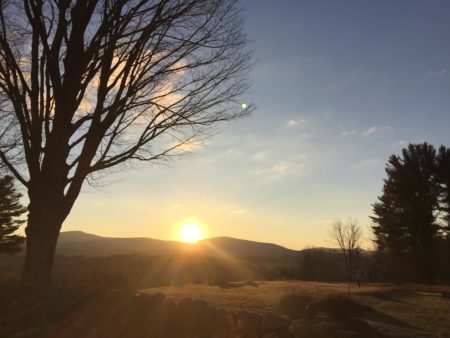 An early riser, an optimist by nature, a lover of mornings, I’m always eager to launch myself into the day. And it doesn’t take much to make me happy: A cup of strong coffee laced with cream or a handful of frozen blueberries from my summer-stash in the freezer, a silly joke shared with my husband, a good-morning text from a far-away friend, the hairy woodpecker hanging upside-down at the feeder, busily extracting his morning ration of sunflower seeds, a sky fluid with traveling clouds executing their own sublime choreography, or a soft grey mantle of mist draped across the nearby hills. Looking around at the life I’m privileged to live, I see much to be grateful for.
An early riser, an optimist by nature, a lover of mornings, I’m always eager to launch myself into the day. And it doesn’t take much to make me happy: A cup of strong coffee laced with cream or a handful of frozen blueberries from my summer-stash in the freezer, a silly joke shared with my husband, a good-morning text from a far-away friend, the hairy woodpecker hanging upside-down at the feeder, busily extracting his morning ration of sunflower seeds, a sky fluid with traveling clouds executing their own sublime choreography, or a soft grey mantle of mist draped across the nearby hills. Looking around at the life I’m privileged to live, I see much to be grateful for.
Yet I’m also conscious these days, in a way I never have been before, that simple gratitude for all that’s good in the world just isn’t enough anymore. At least, it’s not enough for me. Gratitude, if it’s to mean anything at all, must go hand in hand with something else, something less familiar and less comfortable; something I can only call commitment – a willingness on my part to confront with clear eyes all that is wrong, unjust, and dangerous.
This is new. I’ll confess there’s always been a part of me that preferred to leave the world’s intractable, large-scale problems to others to solve. Introvert and homebody that I am, I mostly choose to work behind the scenes and within a smaller circle. Give me a bedside to attend, a friend or loved one who could use a hand or a hug, some small gesture or invisible offering that might ease the way for someone near and dear, and I show up and offer myself wholeheartedly. Give me a worthy cause to support, a garden to weed, a difficult letter to write, or a hot meal to prepare and deliver to a doorstep, and I’m on solid turf. Much of my adult life has been based on faith in our interconnectedness, and each of these small, intimate acts strengthens those connections. Cultivate peace in my heart, embody peace in my relationships, create peace in our home, I believed, and that peace would quietly ripple outward, from me to my loved ones, across our threshold, and on into the larger world.
And so, whenever I stopped long enough to reflect on such questions as “Why am I here?” and “What is my purpose?” the answer seemed pretty clear. I actually found it long ago in some lines by Clarissa Pinkola Estes, words I’ve quoted often because they’ve served me so well as a kind of north star, timeless wisdom by which to navigate:
Ours is not the task of fixing the entire world all at once, but of stretching out to mend the part of the world that is within our reach.
Lately, though, I’ve found myself reconsidering. Is it really enough to mend the part of the world within my reach? My own small gestures seem like paltry offerings in the face of so much uncertainty, so much divisiveness, so much need.
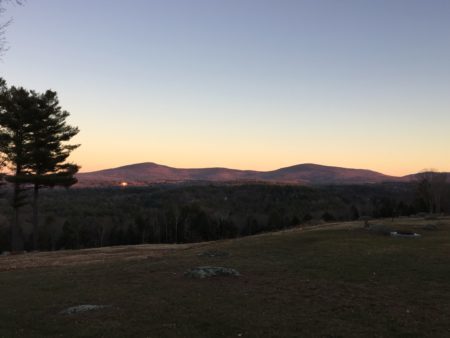 These days, as I stand in my kitchen and watch the sun begin its early morning ascent, I marvel as always at the world’s beauty. And yet my heart does not lift. Instead it fills and sometimes overflows, not just with gratitude but with anxiety and, too, with a silent, pervasive sorrow for the suffering just beyond my reach. It feels as if the very values upon which we’ve built our country, and with which my husband and I raised our children, are under assault in our nation’s capitol. As a friend wrote me this morning after listening to the threats and promises being made in Washington this week: “No arts. No national parks. No public education. When it was suggested to Winston Churchill that money could be raised for the war effort by cutting funding for the arts, he responded, ‘Then what are we fighting for?’” What indeed.
These days, as I stand in my kitchen and watch the sun begin its early morning ascent, I marvel as always at the world’s beauty. And yet my heart does not lift. Instead it fills and sometimes overflows, not just with gratitude but with anxiety and, too, with a silent, pervasive sorrow for the suffering just beyond my reach. It feels as if the very values upon which we’ve built our country, and with which my husband and I raised our children, are under assault in our nation’s capitol. As a friend wrote me this morning after listening to the threats and promises being made in Washington this week: “No arts. No national parks. No public education. When it was suggested to Winston Churchill that money could be raised for the war effort by cutting funding for the arts, he responded, ‘Then what are we fighting for?’” What indeed.
There are many men and women in public office who are fighting to preserve all that is threatened now, from health care to open spaces. But for those dedicated to serving the good of all, for those who are working at this moment to protect our planet and all its people, it is an uphill battle. Their willingness to dig in and stand tall inspires me. There are writers and journalists holding the new decision-makers accountable, explaining what’s at stake, and helping us understand the story beneath the story. Their insights and analysis and commitment to truth are more urgently needed than ever. At the same time, in the words and deeds of the new president and his chosen team, there is little evidence of honesty, fair play, kindness, integrity, empathy, or even basic civility and competence. Amid the noise and bluster, we have not seen much concern for a warming planet under siege nor much reverence for the soul and spirit of our country. I listen and look in vain for words of compassion, cooperation, and a sense of responsibility toward those who are marginalized or vulnerable or different.
And yet, somehow we must affirm and uphold our true values nonetheless. We must become our best selves and our own leaders. We must be even more clear about what matters. We must sustain our belief in our country’s essential goodness even as we stand firm against injustice and intolerance and ineptitude. I do want to celebrate with gratitude the arrival of each new day, just as I’ve always done. But the truth is, there’s a new gravity to all my waking hours. And my feelings as I watch these wintry January dawns are more somber than sweet.
Today, as one era ends and a new one begins, I am grappling with the notion of mending the part of the world within my reach. In the past “the world within my reach” has meant my family and friends and loved ones. It has meant a community of readers and online colleagues and fellow moms and kindred souls. It has meant a home where love and laughter and tears are shared. It has meant a quiet country road where neighbors willingly set their political differences aside and make a point instead of waving hello and greeting one another’s dogs and stopping on walks to pick up trash. It has meant a town where we show up in person each day to buy our groceries and books and clothes, and where the folks at the cash registers know nearly every customer by name.
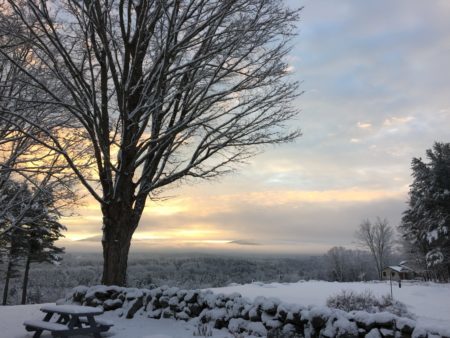 I love this small corner of the earth. Here in my quiet New England town the days and nights proceed as they always have, even as our nation’s capitol undergoes a tension-filled transfer of power and the winds of change and protest gather strength across the land. Here, the sun climbs up over the crest of Pack Monadnock at about 7:15 and I am there to see it, in awe as always at the eternal rhythms of the universe. As I sit typing these words, dusk falls and the sun slips away, vanishing into the trees to the west well before five. There is snow blanketing the field, slush in the road, a deep, imperturbable silence in the woods as night settles over all. My friends and family are nearby. My dog sleeps at my feet. Both our children are thriving in their own adult lives. Our health is fine and our bills are paid and there will be good food on the dinner table tonight.
I love this small corner of the earth. Here in my quiet New England town the days and nights proceed as they always have, even as our nation’s capitol undergoes a tension-filled transfer of power and the winds of change and protest gather strength across the land. Here, the sun climbs up over the crest of Pack Monadnock at about 7:15 and I am there to see it, in awe as always at the eternal rhythms of the universe. As I sit typing these words, dusk falls and the sun slips away, vanishing into the trees to the west well before five. There is snow blanketing the field, slush in the road, a deep, imperturbable silence in the woods as night settles over all. My friends and family are nearby. My dog sleeps at my feet. Both our children are thriving in their own adult lives. Our health is fine and our bills are paid and there will be good food on the dinner table tonight.
So yes, I do have much to be grateful for. And at the same time, I feel the weight of a great deal of world-fixing to be done. And that work, I now know, really is up to me, whether I’m comfortable taking it on or not. It’s up to us. The only thing I know for sure is this: We will not accomplish much if we allow hatred and self-interest and our own small-time fears to divide us. We will not heal what needs healing if we leave the big problems for someone else to solve. Now more than ever, we must indeed stretch out to mend the part of the world within our reach. And we must do something else, too. We must stretch even more and reach even farther than we ever dreamed possible.
(This is part one of a three-part post. Next week: some thoughts about how each of us can stand up and show our souls. As Clarissa Pinkola Estes writes, “Soul on deck shines like gold in dark times.” )
Ours is not the task of fixing the entire world all at once, but of stretching out to mend the part of the world that is within our reach. Any small, calm thing that one soul can do to help another soul, to assist some portion of this poor suffering world, will help immensely. It is not given to us to know which acts or by whom, will cause the critical mass to tip toward an enduring good. What is needed for dramatic change is an accumulation of acts, adding, adding to, adding more, continuing. We know that it does not take everyone on Earth to bring justice and peace, but only a small, determined group who will not give up during the first, second, or hundredth gale.
One of the most calming and powerful actions you can do to intervene in a stormy world is to stand up and show your soul. Soul on deck shines like gold in dark times. The light of the soul throws sparks, can send up flares, builds signal fires, causes proper matters to catch fire. To display the lantern of soul in shadowy times like these — to be fierce and to show mercy toward others; both are acts of immense bravery and greatest necessity. Struggling souls catch light from other souls who are fully lit and willing to show it. If you would help to calm the tumult, this is one of the strongest things you can do.
There will always be times when you feel discouraged. I too have felt despair many times in my life, but I do not keep a chair for it. I will not entertain it. It is not allowed to eat from my plate. […]
In that spirit, I hope you will write this on your wall: When a great ship is in harbor and moored, it is safe, there can be no doubt. But that is not what great ships are built for.
~ Clarissa Pinkola Estes
The post mending the world appeared first on Katrina Kenison.
December 18, 2016
joy, tempered
 I’ve just flicked on the white Christmas lights – there are bright, tiny twinkles on the porch, on the tree, around the fireplace. Earlier, I ran some errands in town and bought groceries at the store where the guys behind the counter know every customer by name. I stopped in at the local bookstore to sign a few copies of my book for special orders. Back home, I filled the birdfeeder and stood outside for awhile, watching the sky change color and waiting for the hungry chickadees to come close. I sat in the kitchen with a cup of tea and ordered a couple of final gifts. The day flew by. It was good, full of reminders of what I love about our life here in this small New England town. And now dusk is falling, along with the temperature; by tomorrow morning it’s predicted to be below zero here. Our son Jack, home for this week, is off playing basketball with a friend. My husband is still at work. And there is time, just enough time, to write a few words before I have to start making dinner.
I’ve just flicked on the white Christmas lights – there are bright, tiny twinkles on the porch, on the tree, around the fireplace. Earlier, I ran some errands in town and bought groceries at the store where the guys behind the counter know every customer by name. I stopped in at the local bookstore to sign a few copies of my book for special orders. Back home, I filled the birdfeeder and stood outside for awhile, watching the sky change color and waiting for the hungry chickadees to come close. I sat in the kitchen with a cup of tea and ordered a couple of final gifts. The day flew by. It was good, full of reminders of what I love about our life here in this small New England town. And now dusk is falling, along with the temperature; by tomorrow morning it’s predicted to be below zero here. Our son Jack, home for this week, is off playing basketball with a friend. My husband is still at work. And there is time, just enough time, to write a few words before I have to start making dinner.
Usually I would relish this moment – a brief pause in the midst of life to gather some thoughts about the meaning of the living. And yet, I’ve been hesitant to write lately. My subject is almost always some variation on the beauty to be found in ordinary life — the pleasure of fully inhabiting small, fleeting moments and the grace proffered by everyday miracles. And as always, I do find both joy and comfort in the simple pleasures of these brief December days: a walk through new-fallen snow, chopping apricots and ginger and chocolate to make our favorite cookies, a candlelit dinner, lingering around the table afterwards as our son reads aloud to us his favorite passage from the long novel he’s just finished. But even joy these days feels complicated, a bit tarnished by my own darker view of our world and my fears about what’s ahead.
 I was about to read your latest post and buy your book,” a reader wrote me recently, “and then only a couple of sentences in, I see you bring up politics.” She continued: “All I want is to read about gardening and family life. I see you have written about acceptance and forgiveness in the past, but you can’t get over the election. So sad.”
I was about to read your latest post and buy your book,” a reader wrote me recently, “and then only a couple of sentences in, I see you bring up politics.” She continued: “All I want is to read about gardening and family life. I see you have written about acceptance and forgiveness in the past, but you can’t get over the election. So sad.”
It’s true. It’s been over a month since I wrote that post and received that letter. And I’m still not over the election.
Most mornings, my husband and I silently maneuver around each other in the kitchen, making coffee and toast and pouring cereal. We look out the window as the sun makes its appearance over the mountains, each day a fresh beginning full of promise and possibility and hope. And then we sit down together as the room fills with light. It is not our way to talk much in the morning, but I imagine he steels himself in some way, as do I, before opening the newspaper. The news of the day offers little in the way of either reassurance or hope.
I’m tempted to turn away, to pick up my new book of Mary Oliver essays instead, and to read about her favorite pond in spring, or the seagull with the broken wing she once rescued on a cold December morning.
“What a life is ours!” she writes. And I agree. What a life to cherish and to notice and to celebrate. Mary Oliver reminds me to pay attention. “Doesn’t anybody in the world anymore want to get up in the middle of the night and sing?” she asks. Yes, yes, I answer, I do. The moon was heavy and full last night, pearl-colored, casting crisp black tree-shadows at the edges of our snow-covered fields. We were awake at 4 am, and the stillness of the world was stunning to behold – a glassy, illuminated landscape stretched out beneath a sky pricked with starlight. It was indeed a night worthy of song. We didn’t sing, but we did gaze. And we whispered together for a while as we looked out the bedroom windows, and then, grateful for our warm, solid house, we snuggled back down amid the pillows. When the sun rose three hours later, we were there to witness it, fully aware of life’s abundance, of our own luck and privilege: to be alive, to live where we do, on this quiet hilltop where, in my own daily life, nothing much has been changed by the election of a new president except the contents of my heart and my growing sense of apprehension for this country I love.
I could choose beautiful sentences to feed my soul at the breakfast table, and in the past I often did just that. Yet it feels somehow irresponsible these days to eschew the stupefying news of the world for my favorite poet’s ruminations about its beauty. Somehow, I must make room in my mind, in my heart, in my day, for both. And so, first, armed with strong coffee, I force myself to absorb the news.
The profound disconnect between our President-elect’s values and my own intensifies by the day. It deepens with each rich, ethically challenged, climate-change-denying Cabinet member he appoints. My sense of shame and disbelief grows with every falsehood he proffers as truth, with each crude put-down or shallow tweet or empty promise or off-the-cuff threat he makes. Meanwhile, I’m increasingly grateful to the hard-working journalists who believe the truth is worth striving for, who work diligently to separate actual fact from Trump-fiction, and who are bold and wise enough to enter this urgent national conversation with clear reporting and much-needed analysis about what’s happening to our democracy. Although I have never considered myself much of a political person, these days I take time to read the long pieces by writers who bring historical perspective and deep understanding of the issues, who can articulate for the rest of us just what’s at stake here. I force myself to consider the worst-case scenarios and I welcome every piece that offers hope or constructive suggestions for how we must work together if we are to save ourselves from ourselves.
I can’t speak for anyone else, but I do know that part of the quiet despair I’ve wrestled with since November arises from my own sense of helplessness, a feeling almost akin to the alarm I once felt as a teenager, in the moments just before I witnessed a car wreck on a quiet road in California. It was terrible and inevitable, that small bright red car’s slow-motion spin out and slide toward destruction. I was stunned by the deafening sound of the impact, followed by the deafening silence of stillness. I have never witnessed anything so frightening and so irreversible, before or since. Indeed, this is a memory I deliberately keep wrapped up and tucked away, for in that long-ago moment there was nothing to be done but watch it happen. Forty years later, there is nothing to be gained in recalling it, except to say that this impotent dread is familiar. This time, though, it’s not a fleeting moment but a constant, underlying sense of powerlessness. And, because I am an adult now, with some practical experience of the consequences of terrible events, I also understand that the moment of impact is only the beginning, and that what follows is much, much worse.
In times like these, when the civic values and precepts we once took for granted are threatened, every impulse we have bends toward action. We want to avert disaster, do something to make things better, spare ourselves and others pain, change the course of events that have already been set in motion. And yet, for the most part, we have no idea what to do. We can choose to stay informed, speak up in public as well as in private, and find ways to support those whose lives are endangered by the perogatives and priorities of this new administration. But the fact is, we can’t do much to change the big picture, and the big picture has grown only more disturbing since November 8.
For me, dealing with these feelings of impotence and sadness and anger is still a daily challenge. Donald Trump will take office. And we, each of us, will have to figure out how to respond to his decisions and their repercussions, whether they immediately impact our daily lives or not.
As my friend Karen Maezen Miller wrote last week, “There was a contract we thought we had, a contract with the future that depended on our effort, intelligence, honesty and decency. Did you ever feel that? It was fragile, to be sure, but it’s what we grew up believing.” Yes, I did grow up believing that. And so I’m right there with her now, when she says, “It feels as if the flags should be flying at half mast.”
The truth is, to me this election did feel like a death of sorts: of ideals, of progress, of a certain, perhaps innocent, faith in the “best self” of our country. And so to acknowledge in its aftermath a sense of grief seems normal. Grief is an informed, reality-based reaction to loss. And loss is what many of us are feeling at this moment. As C. S. Lewis wrote in his beautiful memoir A Grief Observed, “No one ever told me that grief felt so like fear.” I cannot help but read these words and think of another reader I’ve corresponded with over the years, the mother of five African American sons. “I still feel like I have been punched in the gut and I will be grieving for a while,” she wrote me on November 10. “I don’t want people to force me into acceptance.” For this mother, as for millions of others whose lives are rendered more vulnerable by Donald Trump’s election, grief feels very much like fear. She says as much, when she writes about her sons: “I fear for their lives every day, and now more so.”
And yet, grief is never the whole story. As anyone who has survived the death of a loved one well knows, grief often goes hand in hand with grace. There are moments, even in the darkest night, of light. In our grief we find a way to reach out to someone else who is suffering. In our grief we discover the seeds of new resolve, a sense that we can no longer stand by but are ready to stand up instead. In the midst of sadness we become even more grateful for small gestures of kindness and generosity, more attuned to the world’s beauty and its fragility, more compassionate toward others who struggle, more tender as we go about our daily work. In our grief, we’re reminded that even where there appears to be no common ground there is always common humanity. And so, we become a bit more inclined to listen with an open heart, to make a greater effort to understand those who mean well yet see things differently. Slowly, one word and gesture at a time, the fear part of grief can be transformed by a fierce choice for love. There is no one among us who isn’t fighting some battle or another, no one in this world who is immune – to grief, to fear, or to love.
Broken open, with our own inner flags flying at half mast, perhaps we can begin to see a way forward. For me, that way is not marching or protesting or piling up posts on social media platforms. Quiet by nature, I seek out a quiet path. But I have decided, after much reflection, that I will continue to write what I feel. I will continue to trust in the possibility of an ongoing, civil conversation even among people who disagree. For me, choosing love over fear means acknowledging this painful truth: we human beings are not always rational and the issues that divide us are painful and complex. We are not good or bad, but both, flawed and human and striving. And so, I feel a need in my own life to cultivate gratitude and accountability. Both. The gratitude may be for small, simple things – homemade cookies, a sweet text from a friend, a hand to hold. And the actions may be simple, too — another contribution to Planned Parenthood or 350.org, a letter written, a useful piece of writing shared, or an attempt to reach out and support someone else for doing positive work. There is as much cause in this world for hope as there is for despair. It helps me to remember that, to hold both hope and despair in some sort of balance.
By the same token, joy and sadness may seem like opposites, but they are often inextricably intertwined. My challenge isn’t to untangle these threads and toss the dark one away, but to weave something beautiful and true using both. To choose love over fear means finding the courage to speak from my heart, knowing there will surely be more readers who respond, as one did not long ago, “Take me off your email list. I disagree with your politics. This isn’t the forum for such a discussion.”
To choose love over fear means holding this online space as a place where we can indeed have these discussions – not all the time, but certainly in those moments when the personal feels political. To deny that we are all connected, or to suggest that we ought to somehow separate our politics from our daily life is to turn a blind eye to the meaning and complexity of our own existence. I do love gardening, but when I am watching a monarch butterfly alight on a fading coneflower, I can’t help but think beyond my own little patch of ground to the whole planet, and about the dwindling numbers of monarchs. When my family gathers at the dinner table, we don’t turn on the TV, but we do discuss the news of the world; we do our best to make some sense of things that are unfolding far away from our cozy kitchen. To do otherwise is to deny the intimacy of our connection with everything else in the universe.
I am not an expert in parenting, gardening, cooking, literature, or being present with dying loved ones. But as a mother, gardener, cook, reader, and friend, I have been challenged to become more adept at each one of these things. It is the ongoing work of being human that has called forth my greatest efforts, as well as continued questioning and devotion, if not always great skill. And so, I’ve written about my own struggles to do better, to understand more fully, to learn. To me, the value of this writing is not in the expertise I have to offer, but in my willingness to show up, to be vulnerable, and to clear a space in which others may share their experiences, too. And so, I wonder: if this small online home isn’t a forum in which my own thoughts can be expressed and those of others safely heard, then what exactly is it?
It is by choosing love over fear that I share my life in my writing. And it is with love, not fear, that I trust others to receive those offerings with compassion, and perhaps to show up and offer their truth as well. We are here on earth to learn to be ourselves, in all our confusion and hope and beauty and humility. And we are here to listen to each other, as we find our own path forward in a world that feels increasingly confusing and chaotic. May we continue to speak and write with empathy and civility. May we honor our differences with grace and affirm our shared humanity with gratitude for all that binds us. May we be kind.
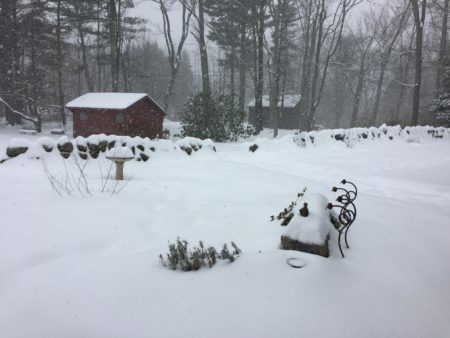 It’s been several days since I sat down before dinner and began writing this piece. I didn’t intend for it to be so long. And yet now, reading it over, I realize there is more I’d hoped to say. But it’s time to close my computer and get on with things. The snow is falling hard here this morning, and there is shoveling to do, cards to mail, and groceries to be bought for the only dinner we will have together this season as a family. One son is still asleep asleep upstairs as I type these words. The other is making his way home from New York City on a slow-moving bus. Tonight, we will light a fire, welcome my parents in, and carry plates of food into the living room. We’ll exchange Christmas stockings and take turns saying what we’re grateful for. The prospect of this entire day fills me with joy. Yes, it’s joy that’s shadowed by my awareness of all that’s not right with the world, but it is also joy that arises from gratitude for all that is. It is joy, tempered. Perhaps that’s the only kind of joy that’s really possible. For today, it’s enough.
It’s been several days since I sat down before dinner and began writing this piece. I didn’t intend for it to be so long. And yet now, reading it over, I realize there is more I’d hoped to say. But it’s time to close my computer and get on with things. The snow is falling hard here this morning, and there is shoveling to do, cards to mail, and groceries to be bought for the only dinner we will have together this season as a family. One son is still asleep asleep upstairs as I type these words. The other is making his way home from New York City on a slow-moving bus. Tonight, we will light a fire, welcome my parents in, and carry plates of food into the living room. We’ll exchange Christmas stockings and take turns saying what we’re grateful for. The prospect of this entire day fills me with joy. Yes, it’s joy that’s shadowed by my awareness of all that’s not right with the world, but it is also joy that arises from gratitude for all that is. It is joy, tempered. Perhaps that’s the only kind of joy that’s really possible. For today, it’s enough.
“Ultimately, we have just one moral duty,” wrote a young Etty Hillesum shortly before she died at Auschwitz at the age of twenty-nine. “To reclaim large areas of peace in ourselves, more and more peace, and to reflect it towards others. And the more peace there is in us, the more peace there will be in our troubled world.”
As this long, difficult year comes to an end, here is one moral duty we can share and work toward together. More peace in our own hearts, more peace in our troubled world.
The post joy, tempered appeared first on Katrina Kenison.
November 19, 2016
of gardens and grandmothersa podcast with Margaret Roach(and a book give-away, too)
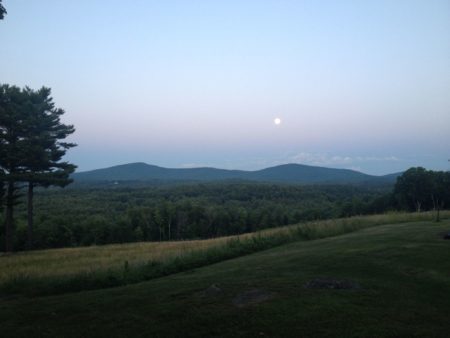 It’s just after 5 a.m. as I type these words, still completely dark outside. But my friend Margaret Roach and I have already said “Good morning” via Skype with a blitz of typed messages. (It’s way too early to talk out loud and risk waking my husband, recovering from a week of flu in our bedroom down the hall.)
It’s just after 5 a.m. as I type these words, still completely dark outside. But my friend Margaret Roach and I have already said “Good morning” via Skype with a blitz of typed messages. (It’s way too early to talk out loud and risk waking my husband, recovering from a week of flu in our bedroom down the hall.)
Margaret reports she’s having trouble sleeping these days, too. Combine post-election angst, the unusually warm November days, darkness descending suddenly at 4 pm each afternoon, and a moon that demands one’s full attention, and it’s little wonder that we’re each feeling a bit out of sync with our normal routines.
For me, there’s a familiar comfort in starting the day with a chat with my dear friend. I picture her already at her desk, wearing slippers and cozy black leggings, cup of green tea in hand, while I’m still propped up against the bed pillows, awaiting the first rays of light before venturing downstairs. Always, we find something to laugh about. Always, we sign off feeling better, even if all we’ve really done is compare notes on our inner clocks’ failures to adjust to the time change and tried to encourage each other to stick with our winter exercise routines.
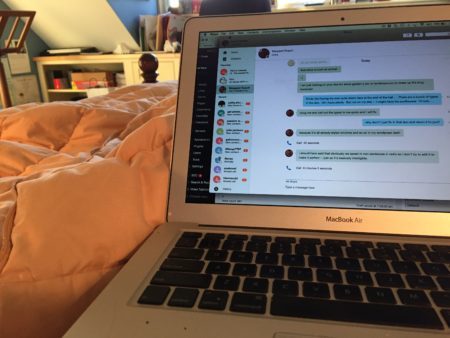 For the last seven years, Margaret has been not only my friend and garden advisor, but also my writing colleague. Because we live three hours away from each other, our early morning Skype sessions are a way for us to stay current between visits. (For me, Margaret’s pre-dawn productivity is also an impetus to get up and get to work.)
For the last seven years, Margaret has been not only my friend and garden advisor, but also my writing colleague. Because we live three hours away from each other, our early morning Skype sessions are a way for us to stay current between visits. (For me, Margaret’s pre-dawn productivity is also an impetus to get up and get to work.)
If we aren’t exchanging advice about under-eye concealer or how to deal with a brazen woodchuck in the garden, we’re trying out ideas for some-day maybe projects, urging each other on as deadlines loom, and sharing the sorts of small experiences in a writer’s life that only another writer would deem worthy of mentioning: an uninterrupted afternoon of writing, a thoughtful note from a reader, a moment in nature that gives rise to inspiration on the page, the perils of procrastination, a Wendell Berry poem that leads to deeper reflection, the joy of getting down one or two good paragraphs.
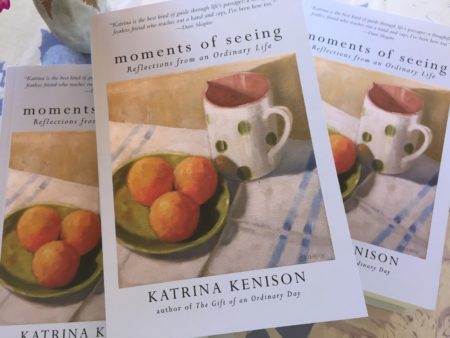 When Margaret received her copy of my new book, Moments of Seeing, she messaged me on Skype after reading an essay about my grandmother. “Well, now I’m crying,” she said. “And of course I’m thinking about my own grandmother, who also left me an invisible yet precious legacy – she was the one who taught me how to garden, and that every plant mattered.”
When Margaret received her copy of my new book, Moments of Seeing, she messaged me on Skype after reading an essay about my grandmother. “Well, now I’m crying,” she said. “And of course I’m thinking about my own grandmother, who also left me an invisible yet precious legacy – she was the one who taught me how to garden, and that every plant mattered.”
With that, Margaret suggested that instead of Skyping in the dark this week, we should open up our conversation to her readers and listeners. Would I like to be a guest on her podcast, and have an on-air chat about grandmothers and Thanksgiving menus and how it feels to self-publish a book? I would!
Honestly, there wasn’t much difference between talking with Margaret in the recording studio and our early morning check-in chats. The twenty minutes flew by, as the time always does when the two of us get going.
In the spirit of Thanksgiving and our friendship, we are both giving away signed copies of Moments of Seeing. And we’d love to hear about your grandmother, too. Leave a comment below and over at Margaret’s as well, to double your chances of winning.
From my home to yours, I wish you a Thanksgiving filled with warmth and love and peace.
the podcast
Visit Margaret here, to listen to our podcast (and to read along with the text if you wish).
Want to order your own signed copy of Moments of Seeing? You can do that here.
how to win the signed books
TO ENTER TO WIN a signed copy of Moments of Seeing, simply comment below, answering the question:
What hand-me-down from your grandmother–whether garden-related, or a recipe, or just some advice or a funny memory–do you want to share? (Or maybe your grandfather was the one you gleaned something enduring from–that’s fine, too.)
Then to double your chances to win—two books are being given away, one on each of our websites—scurry over to Margaret’s book giveaway now and paste your comment there as well. Click here.
No answer to the question, or simply feeling shy? No worry; just say “count me in” or something to that effect, and I will, but a reply is even better.
Winners will be drawn at random after entries close at midnight on Tuesday, November 27. Good luck to all.
The post of gardens and grandmothers
a podcast with Margaret Roach
(and a book give-away, too) appeared first on Katrina Kenison.
November 10, 2016
choosing love over fear
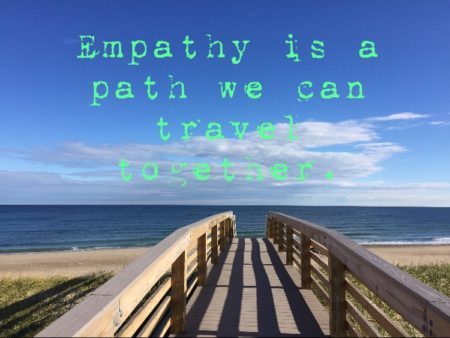 “The world is violent and mercurial — it will have its way with you. We are saved only by love — love for each other and the love that we pour into the art we feel compelled to share: being a parent; being a writer; being a painter; being a friend. We live in a perpetually burning building, and what we must save from it, all the time, is love.” ~ Tennesee Williams
“The world is violent and mercurial — it will have its way with you. We are saved only by love — love for each other and the love that we pour into the art we feel compelled to share: being a parent; being a writer; being a painter; being a friend. We live in a perpetually burning building, and what we must save from it, all the time, is love.” ~ Tennesee Williams
I wonder what would happen if we were all to commit ourselves, over these next months, to small gestures of love, healing, and reconciliation? Would the national mood of distrust and divisiveness change for the better?
What would happen if we took our cues from the graceful, forceful words spoken yesterday by Hillary Clinton and President Obama, both of whom encouraged all Americans to come together now, and to do whatever we can, wherever we are, to repair our torn social fabric?
What would happen if those of us who grieved the results of this election chose today, and in the days ahead, to transform that grief into renewed determination — determination to create a kinder, more tolerant country, one in which to be a citizen means to uphold our deepest national values of freedom and dignity and respect for all Americans?
What would happen if we, both as a people and as elected officials, chose a tack quite different from the obstructionism of the last eight years? What if, instead of predicting Donald Trump’s failure and then doing all we could to ensure it, we chose instead to take President Obama’s advice and to “root for his success”?
What if we were to stake out this territory as our first patch of common ground: a willingness, on both sides, to give our President-elect a chance, to walk alongside him, and to support each step he takes to make good on his election-eve promise to reunite the country?
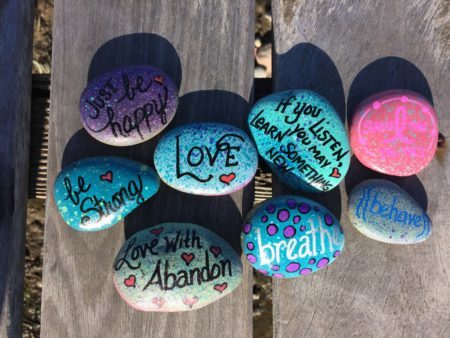 Over the weekend, after posting a blog essay urging women who were considering sitting out the election to vote for Hillary Clinton, I received a number of comments from readers who told me I should not write about politics or even voice a political opinion. I posted all of them, the ones left here and those on Facebook as well, with the exception of one graphic and obscene insult. This morning, as I consider my own path forward, I’m also thinking about how to respond to those messages. There were long-time readers who canceled their subscriptions to my blog, done with me because I was voting differently. Others wrote to let me know I should keep my thoughts to myself, and some wrote to denounce Hillary Clinton as a criminal and to express shock that I would support her.
Over the weekend, after posting a blog essay urging women who were considering sitting out the election to vote for Hillary Clinton, I received a number of comments from readers who told me I should not write about politics or even voice a political opinion. I posted all of them, the ones left here and those on Facebook as well, with the exception of one graphic and obscene insult. This morning, as I consider my own path forward, I’m also thinking about how to respond to those messages. There were long-time readers who canceled their subscriptions to my blog, done with me because I was voting differently. Others wrote to let me know I should keep my thoughts to myself, and some wrote to denounce Hillary Clinton as a criminal and to express shock that I would support her.
Politics is never going to be my beat. Frankly, I’d much rather share a beautiful photo from my daily walk, or words that capture the wonder of some seemingly insignificant moment, or a reflection about how hard it can be to surrender with grace to events not of our choosing.
My own daily life is my theme, with all its ups and downs, and I write about it here not because it’s “mine” but because, in the writing, I find a way to connect not only with my own better self, but with you. Together, we celebrate the goodness of all our ordinary lives and the things that really matter: gratitude, tenderness, acceptance, care.
I write as a way of addressing life’s inevitable challenges and transforming them, with quiet attention, from problems to be surmounted into opportunities for growth.
But there was no way to keep politics separate from life during these last difficult months. There was no way for me not to be affected and distressed by threats of violence, of walls to be erected and international agreements to be broken, of religious tests and mass deportations, and callous boasts about grabbing and assaulting women. I worry about any leader who dismisses climate change as a hoax or who wants sovereignty over women’s bodies or who views our country’s need for some sort of gun control as a conspiracy against Second Amendment rights. These are issues I care about. They do affect my life, as they do all our lives.
To me, to most Americans, it does indeed feel as if there is a great deal at stake in our country right now. That there are differences of opinion about how to solve some of these intractable problems is a given. What is not a given, however, is the manner in which we express and respond to these differences. We can choose to close our ears and our hearts to those who disagree with us. Or we can make an attempt to stand in someone else’s shoes and to see the world through another’s eyes. This is the definition of empathy.
Without apology or excuse, I do make a stand for empathy. And, whether you voted for Donald Trump or Hillary Clinton or another candidate on Tuesday, I invite anyone reading these words to join me. I would like to believe that “empathy” is a value we can all get behind. It’s a path we can travel together. I would like to believe that empathy could be our second patch of common ground. It is a choice each and every one of us can make as we go about our lives, as we interact with people who look different, who love different, who act different, who worship gods other than our own, who hold different views and who make different choices based on those views. Empathy isn’t about changing minds. Empathy is about opening hearts. It’s about choosing love over fear, moment to moment, word by word, deed by deed.
I wasn’t planning to write a blog post this morning. My breakfast dishes are still on the counter, I have work to do, and a bookstore reading tonight to prepare for. But when I opened my email a little while ago, I found one new comment on my blog from last week, from a woman who wanted space there to celebrate Donald Trump’s victory. I could have chosen not to approve it, but that didn’t feel like empathy to me. And so I posted it, and then I answered it. And one thing led to another. So here we are.
To those who said “stick to writing about parenting and family life,” I hear you. Those are subjects dear to my heart. But life is large and complex and the matters we must wrestle with aren’t easily kept in separate boxes. I do believe this, though: we’re all in it together. And there is room here for all of us. Love or fear?
moments of seeing: reflections from an ordinary life
 Finished copies of Moments of Seeing are available and I’m excited to share it with you.
Finished copies of Moments of Seeing are available and I’m excited to share it with you.
If you’d like to purchase a signed copy, click here. (Buy 4, and your shipping is free!)
READINGS:
New Hampshire friends, I’ll be at the lovely Water Street Bookstore in Exeter at 7 pm tonight, Nov. 10.
And on Sunday afternoon, Nov. 13, I return to my old hometown, Winchester, MA, to read at Book Ends.
For info about these and other events, click here.
The post choosing love over fear appeared first on Katrina Kenison.
November 4, 2016
what’s at stake on Tuesday
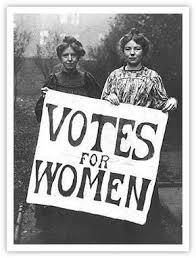 My friend K. is an eighth grade English teacher, a job he loves with an infectious passion. K. works tirelessly to instill in his students a love of reading and of good literature, from Tuck Everlasting to Johnny Tremain. In his classes, the students write every day. And then they read their work aloud, every single one of them volunteering in turn to stand up in front of their classmates and share their innermost thoughts. Secure in the knowledge that they will not be judged, ridiculed, or bullied, these thirteen-year-olds become better writers. They go deep, they stretch, they grow, and they come to trust one another with their most tender thoughts, struggles, and observations.
My friend K. is an eighth grade English teacher, a job he loves with an infectious passion. K. works tirelessly to instill in his students a love of reading and of good literature, from Tuck Everlasting to Johnny Tremain. In his classes, the students write every day. And then they read their work aloud, every single one of them volunteering in turn to stand up in front of their classmates and share their innermost thoughts. Secure in the knowledge that they will not be judged, ridiculed, or bullied, these thirteen-year-olds become better writers. They go deep, they stretch, they grow, and they come to trust one another with their most tender thoughts, struggles, and observations.
Such a sense of security and civility in an eighth-grade classroom doesn’t just happen.
This culture of respect is created, moment by moment and day by day, by a teacher who lets his students know that from the moment they walk through the door, their voices will be heard and honored. K. teaches, by daily example and through ongoing heartfelt discussions with his students, that their greatest achievement in 8th grade English isn’t a perfect test score, but the environment they create together in the classroom – a safe haven in which kindness rules, acceptance is a given, and each person’s opinions matter.
But these days, my friend is discouraged. Two weeks ago he asked his students to take on the topic of “My America,” the theme of this year’s VFW essay contest. As he read through the papers written by his young students, he was stunned to find words of hatred and aggression, words that no school teacher would ever wish to hear in a classroom.
A sample: “In my America, all the foreign immigrants would be sent home.” “In my America, Hillary Clinton would be in jail.” “In my America Hillary Clinton wouldn’t be allowed to run for President, she would be locked up.”
Many of the children’s essays were rife with accusations and threats: Hillary Clinton is a murderer. Hillary Clinton has forced women to have abortions. Hillary Clinton is a crook. Hillary deserves to die.
Clearly, the kind of civilized, compassionate discourse my friend strives to nurture in his classroom is not much valued around the dinner table in the homes of some of his students.
As Tuesday’s election draws near, I know many of us share a sense of profound concern for the outcome. Last summer, after writing an essay here suggesting that we must all become better listeners, I was stunned by the bitter, dismissive responses from readers who had simply assumed I shared their political views.
Upon learning that I support Hillary Clinton, a number of these women, many of whom have enjoyed my writing for nearly twenty years, let me know that they were done with me. I watched the cancelations roll in.
“You should keep your political opinions to yourself,” wrote one reader. “Stick to writing about parenting and family life.”
At the same time, others wrote that although they agreed with me, they were too afraid to express their real thoughts at work, at church, or even in their own families.
I thought long and hard about all of these responses. Perhaps I’m naïve, but I was surprised that anyone would choose to cut off a relationship with me because we see things differently. But I was deeply disturbed, too, that there are so many women in 2016 who feel silenced, women who are afraid to engage in conversations about their own values, their hopes and fears, and their political beliefs.
Should it really require courage and a thick skin to voice an opinion in one’s home or school or place of worship? Are we really willing to raise a generation of children on a diet of inflamed rhetoric, violence, and threatened aggression toward those who are different or who don’t share our beliefs?
Today, I am haunted by the specter of the grandchildren I one day hope to have, and the kind of country they will inherit. I’m not alone. Those of us who care about the health of the planet and the preservation of our democracy have cause to worry as the polls show the election tightening, with Donald Trump as the possible victor.
My good friend Maude Odgers and I have been engaged in a conversation about all of this over the last few days. Neither of us loves politics, and yet we are each committed to participate in this process. Neither of us relishes debate, yet we are each doing the best we can to be well-informed, thoughtful citizens. Neither of us feels excited about this election. And yet, we agree that too much is at stake for us to remain silent. Neither of us feels comfortable being a target of wrath in public. And yet, each of us feels a sense of responsibility at this moment, much as we might prefer to simply sit back and “hope for the best” on Tuesday.
That kind of “safe” silence seems increasingly untenable as we continue to hear from people we care about who say they’re so disgusted with both candidates that they are not going to vote at all. Others say they are just going to write in a name, or that they will vote for a third-party candidate.
In response to these “Never-Trump-But-Not-Hillary” voters, Maude began to craft a letter to send to all the women in her circle, in the hope that her words might inspire others to think more deeply about what’s at stake in this election. The two of us sent the text of this letter back and forth between us a few times yesterday, editing, revising, wanting to get the language right.
It took courage for my friend to write such an emphatic plea and it took more courage for her to send it out, even to a small group of friends.
With Maude’s permission, I share her letter here, within a much larger circle. If it makes sense to you, we hope you, too, will summon your courage and share it. Or, go ahead and draft your own version.
This time, every vote matters. Human decency and dignity are on the line. We urge you to add your voice to ours. Here’s Maude’s letter. May it ripple outward from here.
 “On Election Day, America faces a choice, and it’s not a tough one, but a stark one. It is the difference between tolerance and intolerance. It is the difference between respect and disrespect. It is the difference between a politician with some flaws and a flaw threatening our politics.” —Charles M. Blow, NYT, November 3, 2016.
“On Election Day, America faces a choice, and it’s not a tough one, but a stark one. It is the difference between tolerance and intolerance. It is the difference between respect and disrespect. It is the difference between a politician with some flaws and a flaw threatening our politics.” —Charles M. Blow, NYT, November 3, 2016.
My dear women friends,
I have never before sent out an email urging my friends to vote. But this year I fear for our world, not just our country, which is facing danger if Donald Trump is elected. I know some of you may not like the choices and are choosing not to vote. But I ask you to reconsider that decision. Every non-vote is a vote for Trump.
There are many things I fear about Donald Trump (the list grows by the day). His words and track record speak volumes about the man he really is and isn’t. He has worked his entire adult life for his own benefit, not the benefit of others. His is a record of self-aggrandizement. It is also a well-documented record of misogyny. Donald Trump rates womens’ bodies, sexually assaults women and brags about it, insults women, and has shown no remorse for these transgressions.
Hillary Clinton’s record is far from perfect. However, throughout her long career she has always fought tirelessly for the benefit of others, including: women’s rights, children, education, health care, minorities, the environment, and many others. Hers is a record of service, extending back for thirty years.
In recent days, as the headlines have returned to Hillary Clinton’s emails, many people have come forward with their own personal stories of how Hillary Clinton quietly stepped in to help them when they were in need. Why aren’t those emails leaked, or those stories aired on the evening news? Because they don’t make for titillating headlines. And yet, I feel it’s important to remember that Hillary Clinton has been fighting for women of all ages her entire adult life. This is the HRC I support.
As women I feel we must not forget the many courageous women who preceded us and fought for our right to vote. In many countries women still cannot vote. And in many countries women’s voices are not allowed to be heard—and if they do speak out, they face prosecution and even death. We need to be a voice for all those women who cannot speak. We need to honor the women who worked on our behalf so that we could vote. We need to protect women’s health care and our right to make decisions about our own bodies. We need to protect the human rights of all people. It is not only our moral obligation but our privilege.
Our country does indeed face a stark choice. I don’t believe you need to embrace or even agree with all of Hillary Clinton’s positions in order to vote for her. I do believe that an America with Donald Trump at the helm is not a country most of us would want to live in.
Also, it is important that we take our civic responsibility seriously and go to the polls to vote for the hard-working and thoughtful people who are running to guide our states forward. Their voices and hard work deserve our support, too.
I attach this opinion (partially quoted above) from Charles Blow of the NYT, which says it all.
Trump is an Existential Threat
And here, from the other side, are two thoughtful essays by highly respected Republicans who will be supporting Hillary Clinton on Tuesday:
In Defense of Politics Now More than Ever
Thank you for taking the time to read this letter and these opinions. It’s important that we all vote. It is equally important that we, as women, continue to make our voices heard.
The post what’s at stake on Tuesday appeared first on Katrina Kenison.



